Work Collaboratively with Care Network and Other Services QUESTION
VerifiedAdded on 2021/02/21
|18
|6069
|130
AI Summary
WORK COLLABORATIVELY WITH CARE NETWORK AND OTHER SERVICES QUESTION 1 1 Codes of practice1 Discrimination1 Dignity of risk 1 Duty of care 2 Human rights 2 Mandatory reporting 2 Practice standards 3 Privacy, confidentiality and disclosure 3 Policy frameworks4 Records management 4 Rights and responsibilities of workers, employers and individuals accessing the service 4 Specific duty mental health legislation and its impact on individual workers5 Work role boundaries—responsibilities and limitations 5 Work health and safety 5 QUESTION 2 6 Recovery 6 Recovery oriented
Contribute Materials
Your contribution can guide someone’s learning journey. Share your
documents today.
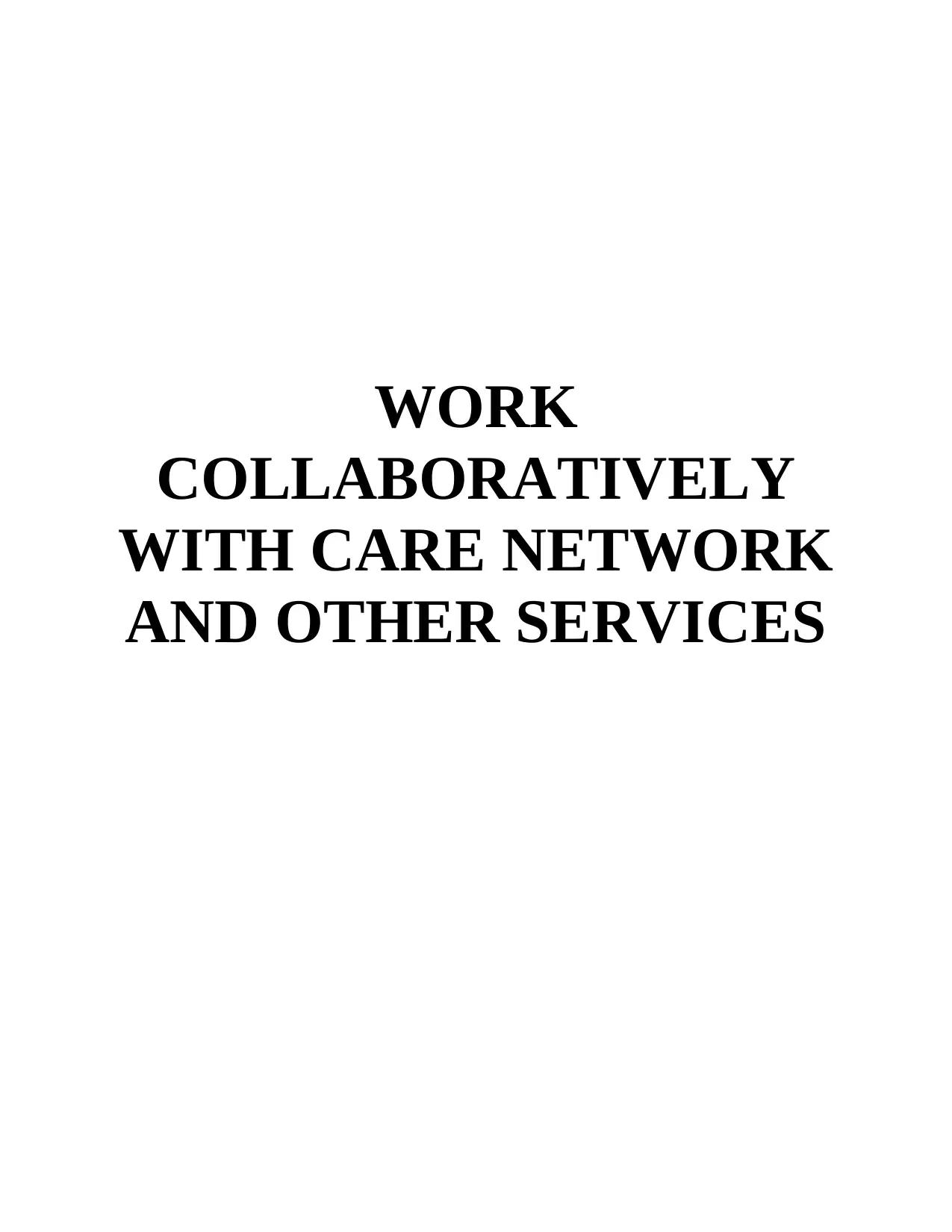
WORK
COLLABORATIVELY
WITH CARE NETWORK
AND OTHER SERVICES
COLLABORATIVELY
WITH CARE NETWORK
AND OTHER SERVICES
Secure Best Marks with AI Grader
Need help grading? Try our AI Grader for instant feedback on your assignments.
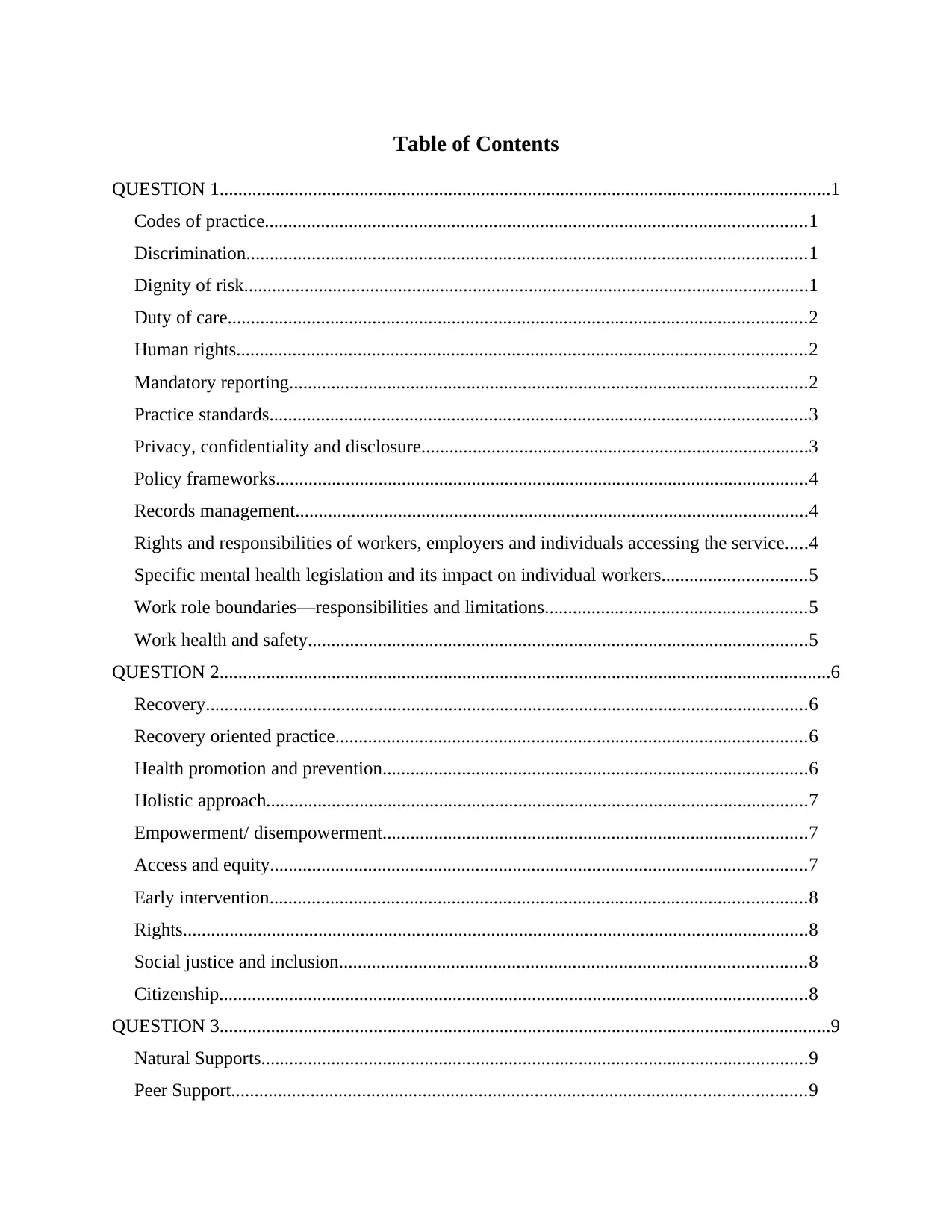
Table of Contents
QUESTION 1...................................................................................................................................1
Codes of practice....................................................................................................................1
Discrimination........................................................................................................................1
Dignity of risk.........................................................................................................................1
Duty of care............................................................................................................................2
Human rights..........................................................................................................................2
Mandatory reporting...............................................................................................................2
Practice standards...................................................................................................................3
Privacy, confidentiality and disclosure...................................................................................3
Policy frameworks..................................................................................................................4
Records management..............................................................................................................4
Rights and responsibilities of workers, employers and individuals accessing the service.....4
Specific mental health legislation and its impact on individual workers...............................5
Work role boundaries—responsibilities and limitations........................................................5
Work health and safety...........................................................................................................5
QUESTION 2...................................................................................................................................6
Recovery.................................................................................................................................6
Recovery oriented practice.....................................................................................................6
Health promotion and prevention...........................................................................................6
Holistic approach....................................................................................................................7
Empowerment/ disempowerment...........................................................................................7
Access and equity...................................................................................................................7
Early intervention...................................................................................................................8
Rights......................................................................................................................................8
Social justice and inclusion....................................................................................................8
Citizenship..............................................................................................................................8
QUESTION 3...................................................................................................................................9
Natural Supports.....................................................................................................................9
Peer Support...........................................................................................................................9
QUESTION 1...................................................................................................................................1
Codes of practice....................................................................................................................1
Discrimination........................................................................................................................1
Dignity of risk.........................................................................................................................1
Duty of care............................................................................................................................2
Human rights..........................................................................................................................2
Mandatory reporting...............................................................................................................2
Practice standards...................................................................................................................3
Privacy, confidentiality and disclosure...................................................................................3
Policy frameworks..................................................................................................................4
Records management..............................................................................................................4
Rights and responsibilities of workers, employers and individuals accessing the service.....4
Specific mental health legislation and its impact on individual workers...............................5
Work role boundaries—responsibilities and limitations........................................................5
Work health and safety...........................................................................................................5
QUESTION 2...................................................................................................................................6
Recovery.................................................................................................................................6
Recovery oriented practice.....................................................................................................6
Health promotion and prevention...........................................................................................6
Holistic approach....................................................................................................................7
Empowerment/ disempowerment...........................................................................................7
Access and equity...................................................................................................................7
Early intervention...................................................................................................................8
Rights......................................................................................................................................8
Social justice and inclusion....................................................................................................8
Citizenship..............................................................................................................................8
QUESTION 3...................................................................................................................................9
Natural Supports.....................................................................................................................9
Peer Support...........................................................................................................................9

Family, Friends and Carers.....................................................................................................9
Formal Services....................................................................................................................10
QUESTION 4.................................................................................................................................10
QUESTION 5.................................................................................................................................11
QUESTION 6.................................................................................................................................11
QUESTION 7.................................................................................................................................12
Local Services......................................................................................................................12
State Services........................................................................................................................13
QUESTION 8.................................................................................................................................13
REFERENCES..............................................................................................................................14
Formal Services....................................................................................................................10
QUESTION 4.................................................................................................................................10
QUESTION 5.................................................................................................................................11
QUESTION 6.................................................................................................................................11
QUESTION 7.................................................................................................................................12
Local Services......................................................................................................................12
State Services........................................................................................................................13
QUESTION 8.................................................................................................................................13
REFERENCES..............................................................................................................................14
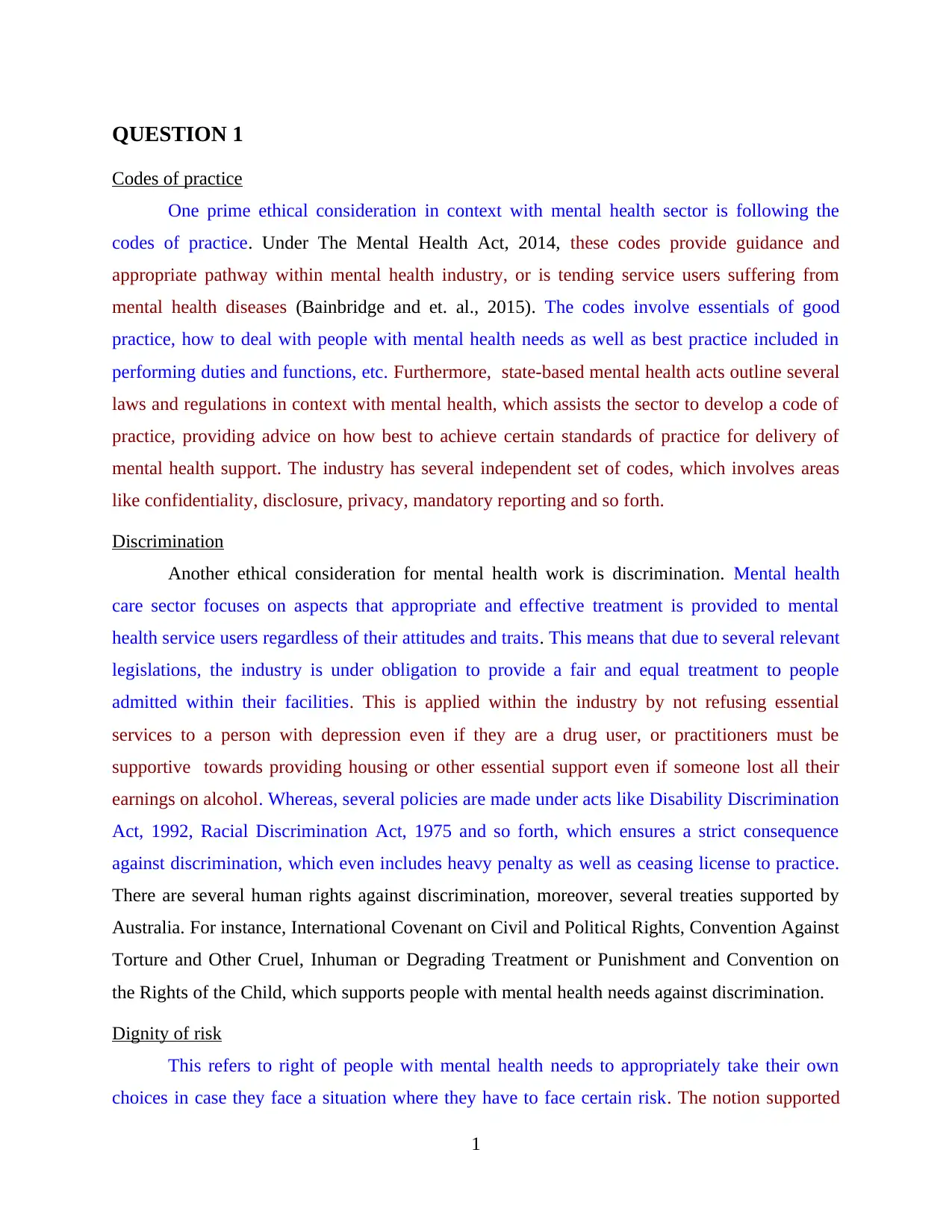
QUESTION 1
Codes of practice
One prime ethical consideration in context with mental health sector is following the
codes of practice. Under The Mental Health Act, 2014, these codes provide guidance and
appropriate pathway within mental health industry, or is tending service users suffering from
mental health diseases (Bainbridge and et. al., 2015). The codes involve essentials of good
practice, how to deal with people with mental health needs as well as best practice included in
performing duties and functions, etc. Furthermore, state-based mental health acts outline several
laws and regulations in context with mental health, which assists the sector to develop a code of
practice, providing advice on how best to achieve certain standards of practice for delivery of
mental health support. The industry has several independent set of codes, which involves areas
like confidentiality, disclosure, privacy, mandatory reporting and so forth.
Discrimination
Another ethical consideration for mental health work is discrimination. Mental health
care sector focuses on aspects that appropriate and effective treatment is provided to mental
health service users regardless of their attitudes and traits. This means that due to several relevant
legislations, the industry is under obligation to provide a fair and equal treatment to people
admitted within their facilities. This is applied within the industry by not refusing essential
services to a person with depression even if they are a drug user, or practitioners must be
supportive towards providing housing or other essential support even if someone lost all their
earnings on alcohol. Whereas, several policies are made under acts like Disability Discrimination
Act, 1992, Racial Discrimination Act, 1975 and so forth, which ensures a strict consequence
against discrimination, which even includes heavy penalty as well as ceasing license to practice.
There are several human rights against discrimination, moreover, several treaties supported by
Australia. For instance, International Covenant on Civil and Political Rights, Convention Against
Torture and Other Cruel, Inhuman or Degrading Treatment or Punishment and Convention on
the Rights of the Child, which supports people with mental health needs against discrimination.
Dignity of risk
This refers to right of people with mental health needs to appropriately take their own
choices in case they face a situation where they have to face certain risk. The notion supported
1
Codes of practice
One prime ethical consideration in context with mental health sector is following the
codes of practice. Under The Mental Health Act, 2014, these codes provide guidance and
appropriate pathway within mental health industry, or is tending service users suffering from
mental health diseases (Bainbridge and et. al., 2015). The codes involve essentials of good
practice, how to deal with people with mental health needs as well as best practice included in
performing duties and functions, etc. Furthermore, state-based mental health acts outline several
laws and regulations in context with mental health, which assists the sector to develop a code of
practice, providing advice on how best to achieve certain standards of practice for delivery of
mental health support. The industry has several independent set of codes, which involves areas
like confidentiality, disclosure, privacy, mandatory reporting and so forth.
Discrimination
Another ethical consideration for mental health work is discrimination. Mental health
care sector focuses on aspects that appropriate and effective treatment is provided to mental
health service users regardless of their attitudes and traits. This means that due to several relevant
legislations, the industry is under obligation to provide a fair and equal treatment to people
admitted within their facilities. This is applied within the industry by not refusing essential
services to a person with depression even if they are a drug user, or practitioners must be
supportive towards providing housing or other essential support even if someone lost all their
earnings on alcohol. Whereas, several policies are made under acts like Disability Discrimination
Act, 1992, Racial Discrimination Act, 1975 and so forth, which ensures a strict consequence
against discrimination, which even includes heavy penalty as well as ceasing license to practice.
There are several human rights against discrimination, moreover, several treaties supported by
Australia. For instance, International Covenant on Civil and Political Rights, Convention Against
Torture and Other Cruel, Inhuman or Degrading Treatment or Punishment and Convention on
the Rights of the Child, which supports people with mental health needs against discrimination.
Dignity of risk
This refers to right of people with mental health needs to appropriately take their own
choices in case they face a situation where they have to face certain risk. The notion supported
1
Secure Best Marks with AI Grader
Need help grading? Try our AI Grader for instant feedback on your assignments.
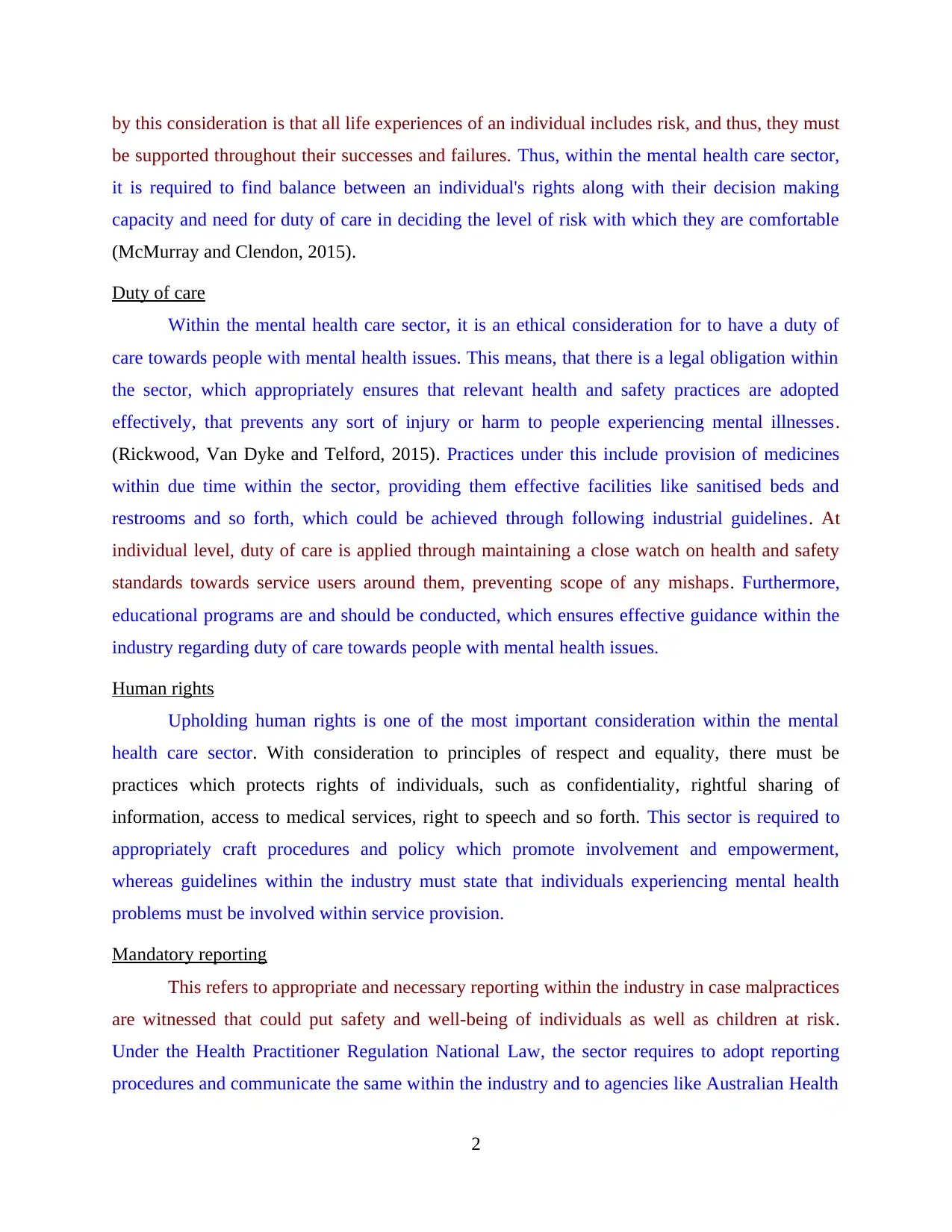
by this consideration is that all life experiences of an individual includes risk, and thus, they must
be supported throughout their successes and failures. Thus, within the mental health care sector,
it is required to find balance between an individual's rights along with their decision making
capacity and need for duty of care in deciding the level of risk with which they are comfortable
(McMurray and Clendon, 2015).
Duty of care
Within the mental health care sector, it is an ethical consideration for to have a duty of
care towards people with mental health issues. This means, that there is a legal obligation within
the sector, which appropriately ensures that relevant health and safety practices are adopted
effectively, that prevents any sort of injury or harm to people experiencing mental illnesses.
(Rickwood, Van Dyke and Telford, 2015). Practices under this include provision of medicines
within due time within the sector, providing them effective facilities like sanitised beds and
restrooms and so forth, which could be achieved through following industrial guidelines. At
individual level, duty of care is applied through maintaining a close watch on health and safety
standards towards service users around them, preventing scope of any mishaps. Furthermore,
educational programs are and should be conducted, which ensures effective guidance within the
industry regarding duty of care towards people with mental health issues.
Human rights
Upholding human rights is one of the most important consideration within the mental
health care sector. With consideration to principles of respect and equality, there must be
practices which protects rights of individuals, such as confidentiality, rightful sharing of
information, access to medical services, right to speech and so forth. This sector is required to
appropriately craft procedures and policy which promote involvement and empowerment,
whereas guidelines within the industry must state that individuals experiencing mental health
problems must be involved within service provision.
Mandatory reporting
This refers to appropriate and necessary reporting within the industry in case malpractices
are witnessed that could put safety and well-being of individuals as well as children at risk.
Under the Health Practitioner Regulation National Law, the sector requires to adopt reporting
procedures and communicate the same within the industry and to agencies like Australian Health
2
be supported throughout their successes and failures. Thus, within the mental health care sector,
it is required to find balance between an individual's rights along with their decision making
capacity and need for duty of care in deciding the level of risk with which they are comfortable
(McMurray and Clendon, 2015).
Duty of care
Within the mental health care sector, it is an ethical consideration for to have a duty of
care towards people with mental health issues. This means, that there is a legal obligation within
the sector, which appropriately ensures that relevant health and safety practices are adopted
effectively, that prevents any sort of injury or harm to people experiencing mental illnesses.
(Rickwood, Van Dyke and Telford, 2015). Practices under this include provision of medicines
within due time within the sector, providing them effective facilities like sanitised beds and
restrooms and so forth, which could be achieved through following industrial guidelines. At
individual level, duty of care is applied through maintaining a close watch on health and safety
standards towards service users around them, preventing scope of any mishaps. Furthermore,
educational programs are and should be conducted, which ensures effective guidance within the
industry regarding duty of care towards people with mental health issues.
Human rights
Upholding human rights is one of the most important consideration within the mental
health care sector. With consideration to principles of respect and equality, there must be
practices which protects rights of individuals, such as confidentiality, rightful sharing of
information, access to medical services, right to speech and so forth. This sector is required to
appropriately craft procedures and policy which promote involvement and empowerment,
whereas guidelines within the industry must state that individuals experiencing mental health
problems must be involved within service provision.
Mandatory reporting
This refers to appropriate and necessary reporting within the industry in case malpractices
are witnessed that could put safety and well-being of individuals as well as children at risk.
Under the Health Practitioner Regulation National Law, the sector requires to adopt reporting
procedures and communicate the same within the industry and to agencies like Australian Health
2
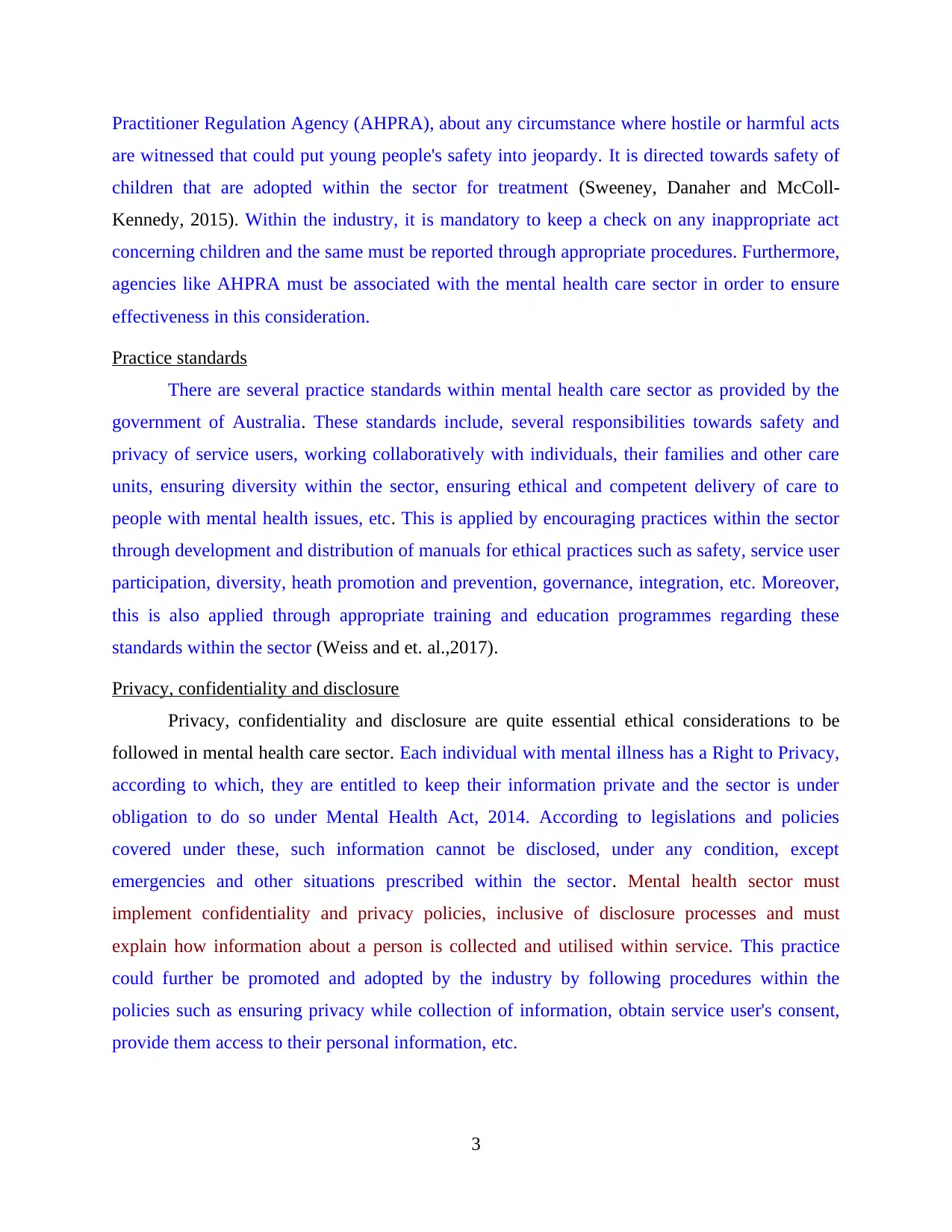
Practitioner Regulation Agency (AHPRA), about any circumstance where hostile or harmful acts
are witnessed that could put young people's safety into jeopardy. It is directed towards safety of
children that are adopted within the sector for treatment (Sweeney, Danaher and McColl-
Kennedy, 2015). Within the industry, it is mandatory to keep a check on any inappropriate act
concerning children and the same must be reported through appropriate procedures. Furthermore,
agencies like AHPRA must be associated with the mental health care sector in order to ensure
effectiveness in this consideration.
Practice standards
There are several practice standards within mental health care sector as provided by the
government of Australia. These standards include, several responsibilities towards safety and
privacy of service users, working collaboratively with individuals, their families and other care
units, ensuring diversity within the sector, ensuring ethical and competent delivery of care to
people with mental health issues, etc. This is applied by encouraging practices within the sector
through development and distribution of manuals for ethical practices such as safety, service user
participation, diversity, heath promotion and prevention, governance, integration, etc. Moreover,
this is also applied through appropriate training and education programmes regarding these
standards within the sector (Weiss and et. al.,2017).
Privacy, confidentiality and disclosure
Privacy, confidentiality and disclosure are quite essential ethical considerations to be
followed in mental health care sector. Each individual with mental illness has a Right to Privacy,
according to which, they are entitled to keep their information private and the sector is under
obligation to do so under Mental Health Act, 2014. According to legislations and policies
covered under these, such information cannot be disclosed, under any condition, except
emergencies and other situations prescribed within the sector. Mental health sector must
implement confidentiality and privacy policies, inclusive of disclosure processes and must
explain how information about a person is collected and utilised within service. This practice
could further be promoted and adopted by the industry by following procedures within the
policies such as ensuring privacy while collection of information, obtain service user's consent,
provide them access to their personal information, etc.
3
are witnessed that could put young people's safety into jeopardy. It is directed towards safety of
children that are adopted within the sector for treatment (Sweeney, Danaher and McColl-
Kennedy, 2015). Within the industry, it is mandatory to keep a check on any inappropriate act
concerning children and the same must be reported through appropriate procedures. Furthermore,
agencies like AHPRA must be associated with the mental health care sector in order to ensure
effectiveness in this consideration.
Practice standards
There are several practice standards within mental health care sector as provided by the
government of Australia. These standards include, several responsibilities towards safety and
privacy of service users, working collaboratively with individuals, their families and other care
units, ensuring diversity within the sector, ensuring ethical and competent delivery of care to
people with mental health issues, etc. This is applied by encouraging practices within the sector
through development and distribution of manuals for ethical practices such as safety, service user
participation, diversity, heath promotion and prevention, governance, integration, etc. Moreover,
this is also applied through appropriate training and education programmes regarding these
standards within the sector (Weiss and et. al.,2017).
Privacy, confidentiality and disclosure
Privacy, confidentiality and disclosure are quite essential ethical considerations to be
followed in mental health care sector. Each individual with mental illness has a Right to Privacy,
according to which, they are entitled to keep their information private and the sector is under
obligation to do so under Mental Health Act, 2014. According to legislations and policies
covered under these, such information cannot be disclosed, under any condition, except
emergencies and other situations prescribed within the sector. Mental health sector must
implement confidentiality and privacy policies, inclusive of disclosure processes and must
explain how information about a person is collected and utilised within service. This practice
could further be promoted and adopted by the industry by following procedures within the
policies such as ensuring privacy while collection of information, obtain service user's consent,
provide them access to their personal information, etc.
3
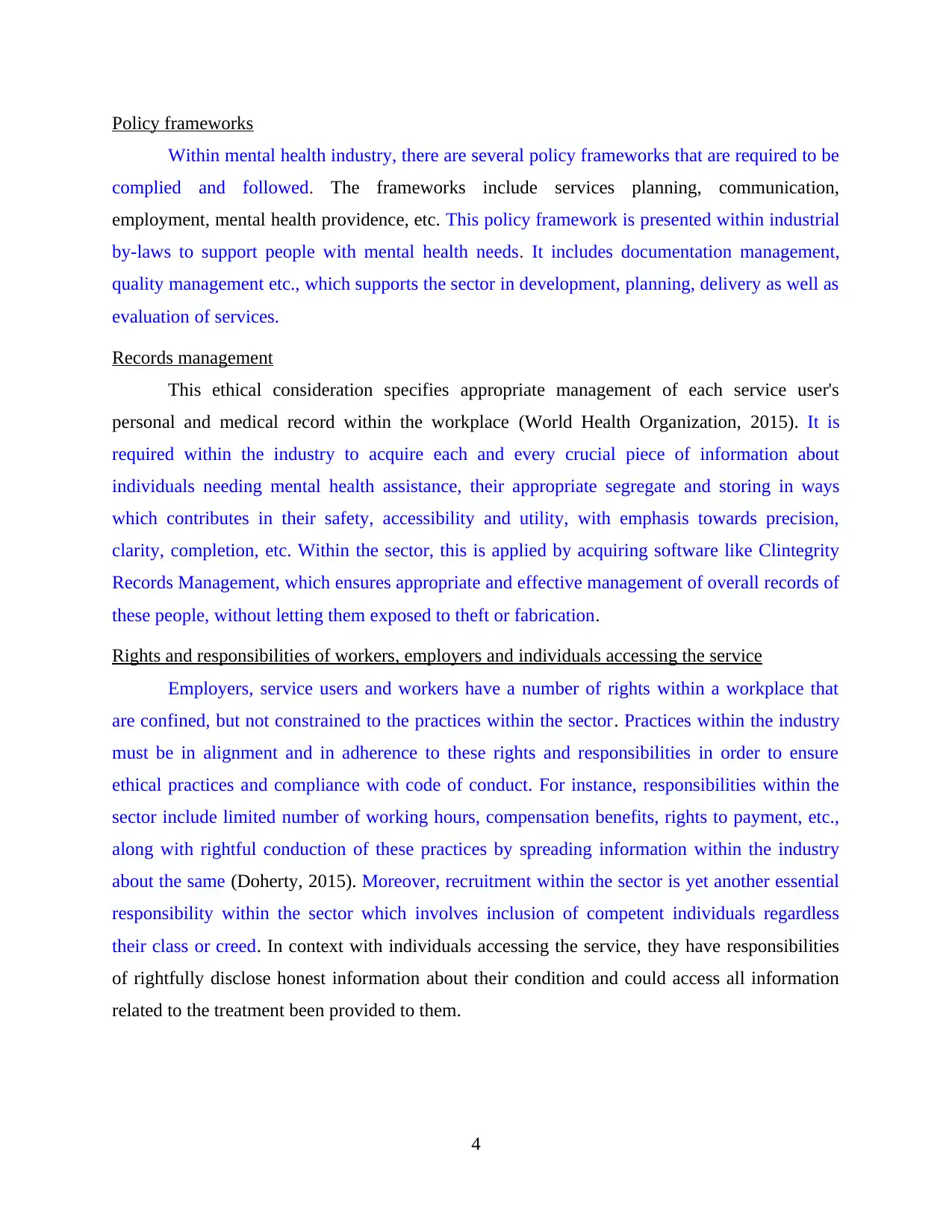
Policy frameworks
Within mental health industry, there are several policy frameworks that are required to be
complied and followed. The frameworks include services planning, communication,
employment, mental health providence, etc. This policy framework is presented within industrial
by-laws to support people with mental health needs. It includes documentation management,
quality management etc., which supports the sector in development, planning, delivery as well as
evaluation of services.
Records management
This ethical consideration specifies appropriate management of each service user's
personal and medical record within the workplace (World Health Organization, 2015). It is
required within the industry to acquire each and every crucial piece of information about
individuals needing mental health assistance, their appropriate segregate and storing in ways
which contributes in their safety, accessibility and utility, with emphasis towards precision,
clarity, completion, etc. Within the sector, this is applied by acquiring software like Clintegrity
Records Management, which ensures appropriate and effective management of overall records of
these people, without letting them exposed to theft or fabrication.
Rights and responsibilities of workers, employers and individuals accessing the service
Employers, service users and workers have a number of rights within a workplace that
are confined, but not constrained to the practices within the sector. Practices within the industry
must be in alignment and in adherence to these rights and responsibilities in order to ensure
ethical practices and compliance with code of conduct. For instance, responsibilities within the
sector include limited number of working hours, compensation benefits, rights to payment, etc.,
along with rightful conduction of these practices by spreading information within the industry
about the same (Doherty, 2015). Moreover, recruitment within the sector is yet another essential
responsibility within the sector which involves inclusion of competent individuals regardless
their class or creed. In context with individuals accessing the service, they have responsibilities
of rightfully disclose honest information about their condition and could access all information
related to the treatment been provided to them.
4
Within mental health industry, there are several policy frameworks that are required to be
complied and followed. The frameworks include services planning, communication,
employment, mental health providence, etc. This policy framework is presented within industrial
by-laws to support people with mental health needs. It includes documentation management,
quality management etc., which supports the sector in development, planning, delivery as well as
evaluation of services.
Records management
This ethical consideration specifies appropriate management of each service user's
personal and medical record within the workplace (World Health Organization, 2015). It is
required within the industry to acquire each and every crucial piece of information about
individuals needing mental health assistance, their appropriate segregate and storing in ways
which contributes in their safety, accessibility and utility, with emphasis towards precision,
clarity, completion, etc. Within the sector, this is applied by acquiring software like Clintegrity
Records Management, which ensures appropriate and effective management of overall records of
these people, without letting them exposed to theft or fabrication.
Rights and responsibilities of workers, employers and individuals accessing the service
Employers, service users and workers have a number of rights within a workplace that
are confined, but not constrained to the practices within the sector. Practices within the industry
must be in alignment and in adherence to these rights and responsibilities in order to ensure
ethical practices and compliance with code of conduct. For instance, responsibilities within the
sector include limited number of working hours, compensation benefits, rights to payment, etc.,
along with rightful conduction of these practices by spreading information within the industry
about the same (Doherty, 2015). Moreover, recruitment within the sector is yet another essential
responsibility within the sector which involves inclusion of competent individuals regardless
their class or creed. In context with individuals accessing the service, they have responsibilities
of rightfully disclose honest information about their condition and could access all information
related to the treatment been provided to them.
4
Paraphrase This Document
Need a fresh take? Get an instant paraphrase of this document with our AI Paraphraser
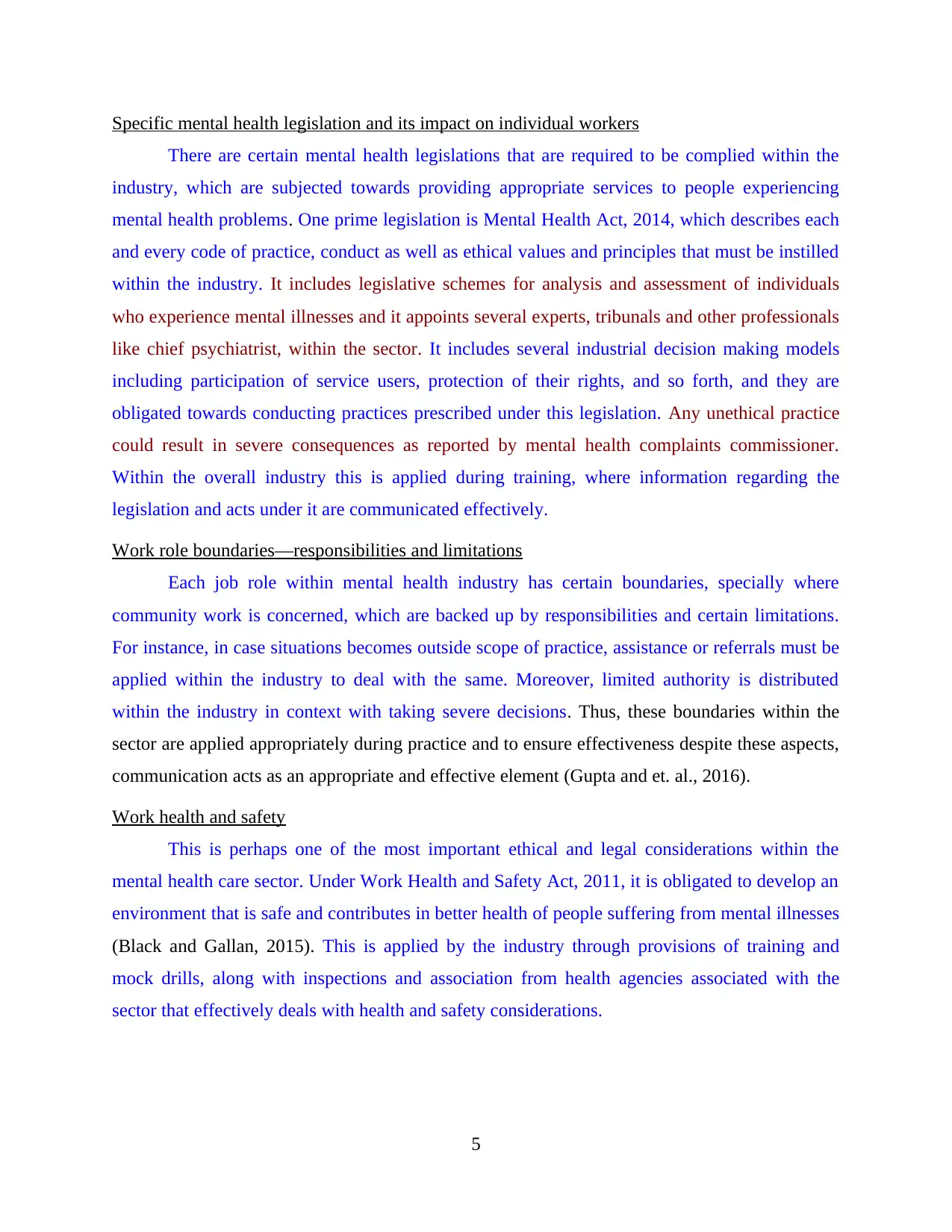
Specific mental health legislation and its impact on individual workers
There are certain mental health legislations that are required to be complied within the
industry, which are subjected towards providing appropriate services to people experiencing
mental health problems. One prime legislation is Mental Health Act, 2014, which describes each
and every code of practice, conduct as well as ethical values and principles that must be instilled
within the industry. It includes legislative schemes for analysis and assessment of individuals
who experience mental illnesses and it appoints several experts, tribunals and other professionals
like chief psychiatrist, within the sector. It includes several industrial decision making models
including participation of service users, protection of their rights, and so forth, and they are
obligated towards conducting practices prescribed under this legislation. Any unethical practice
could result in severe consequences as reported by mental health complaints commissioner.
Within the overall industry this is applied during training, where information regarding the
legislation and acts under it are communicated effectively.
Work role boundaries—responsibilities and limitations
Each job role within mental health industry has certain boundaries, specially where
community work is concerned, which are backed up by responsibilities and certain limitations.
For instance, in case situations becomes outside scope of practice, assistance or referrals must be
applied within the industry to deal with the same. Moreover, limited authority is distributed
within the industry in context with taking severe decisions. Thus, these boundaries within the
sector are applied appropriately during practice and to ensure effectiveness despite these aspects,
communication acts as an appropriate and effective element (Gupta and et. al., 2016).
Work health and safety
This is perhaps one of the most important ethical and legal considerations within the
mental health care sector. Under Work Health and Safety Act, 2011, it is obligated to develop an
environment that is safe and contributes in better health of people suffering from mental illnesses
(Black and Gallan, 2015). This is applied by the industry through provisions of training and
mock drills, along with inspections and association from health agencies associated with the
sector that effectively deals with health and safety considerations.
5
There are certain mental health legislations that are required to be complied within the
industry, which are subjected towards providing appropriate services to people experiencing
mental health problems. One prime legislation is Mental Health Act, 2014, which describes each
and every code of practice, conduct as well as ethical values and principles that must be instilled
within the industry. It includes legislative schemes for analysis and assessment of individuals
who experience mental illnesses and it appoints several experts, tribunals and other professionals
like chief psychiatrist, within the sector. It includes several industrial decision making models
including participation of service users, protection of their rights, and so forth, and they are
obligated towards conducting practices prescribed under this legislation. Any unethical practice
could result in severe consequences as reported by mental health complaints commissioner.
Within the overall industry this is applied during training, where information regarding the
legislation and acts under it are communicated effectively.
Work role boundaries—responsibilities and limitations
Each job role within mental health industry has certain boundaries, specially where
community work is concerned, which are backed up by responsibilities and certain limitations.
For instance, in case situations becomes outside scope of practice, assistance or referrals must be
applied within the industry to deal with the same. Moreover, limited authority is distributed
within the industry in context with taking severe decisions. Thus, these boundaries within the
sector are applied appropriately during practice and to ensure effectiveness despite these aspects,
communication acts as an appropriate and effective element (Gupta and et. al., 2016).
Work health and safety
This is perhaps one of the most important ethical and legal considerations within the
mental health care sector. Under Work Health and Safety Act, 2011, it is obligated to develop an
environment that is safe and contributes in better health of people suffering from mental illnesses
(Black and Gallan, 2015). This is applied by the industry through provisions of training and
mock drills, along with inspections and association from health agencies associated with the
sector that effectively deals with health and safety considerations.
5
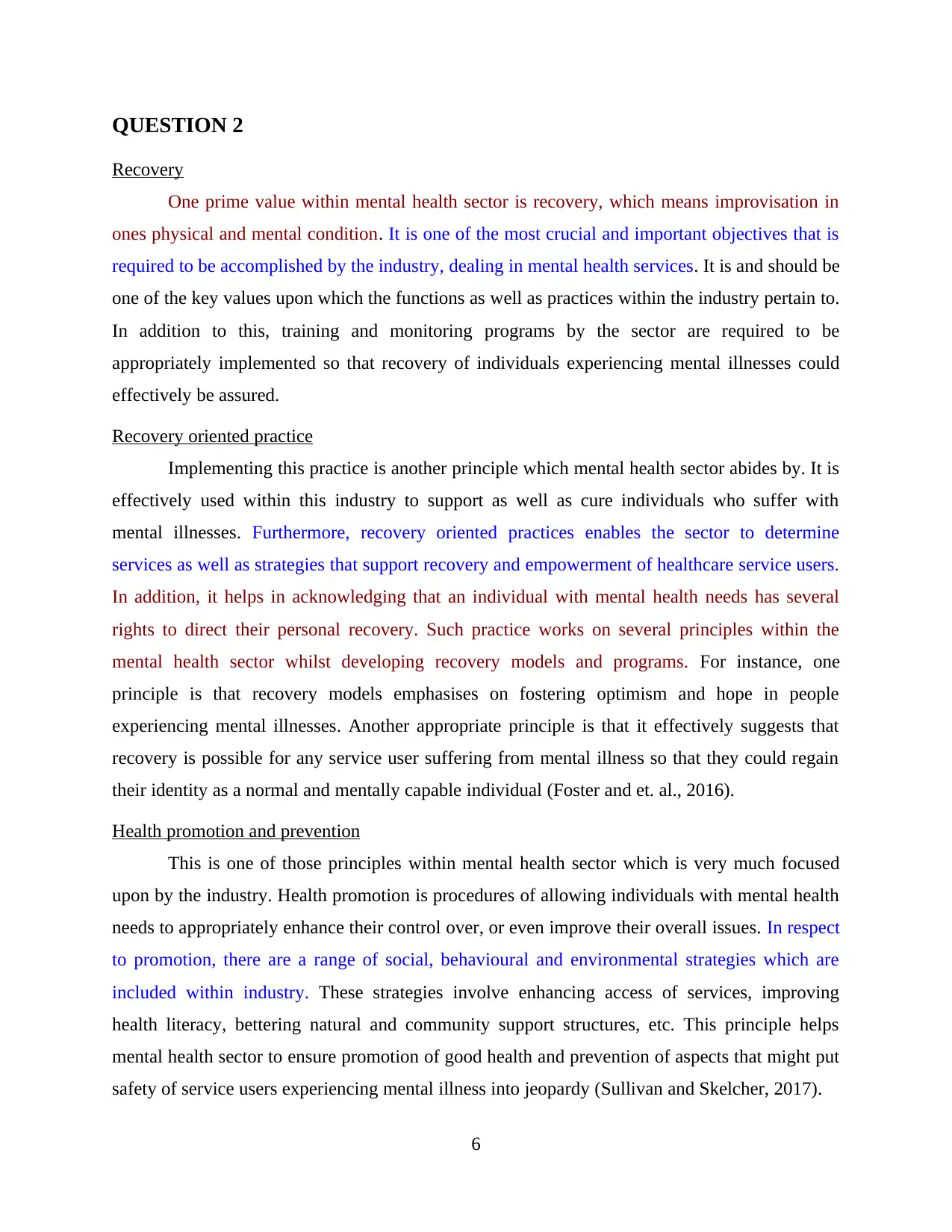
QUESTION 2
Recovery
One prime value within mental health sector is recovery, which means improvisation in
ones physical and mental condition. It is one of the most crucial and important objectives that is
required to be accomplished by the industry, dealing in mental health services. It is and should be
one of the key values upon which the functions as well as practices within the industry pertain to.
In addition to this, training and monitoring programs by the sector are required to be
appropriately implemented so that recovery of individuals experiencing mental illnesses could
effectively be assured.
Recovery oriented practice
Implementing this practice is another principle which mental health sector abides by. It is
effectively used within this industry to support as well as cure individuals who suffer with
mental illnesses. Furthermore, recovery oriented practices enables the sector to determine
services as well as strategies that support recovery and empowerment of healthcare service users.
In addition, it helps in acknowledging that an individual with mental health needs has several
rights to direct their personal recovery. Such practice works on several principles within the
mental health sector whilst developing recovery models and programs. For instance, one
principle is that recovery models emphasises on fostering optimism and hope in people
experiencing mental illnesses. Another appropriate principle is that it effectively suggests that
recovery is possible for any service user suffering from mental illness so that they could regain
their identity as a normal and mentally capable individual (Foster and et. al., 2016).
Health promotion and prevention
This is one of those principles within mental health sector which is very much focused
upon by the industry. Health promotion is procedures of allowing individuals with mental health
needs to appropriately enhance their control over, or even improve their overall issues. In respect
to promotion, there are a range of social, behavioural and environmental strategies which are
included within industry. These strategies involve enhancing access of services, improving
health literacy, bettering natural and community support structures, etc. This principle helps
mental health sector to ensure promotion of good health and prevention of aspects that might put
safety of service users experiencing mental illness into jeopardy (Sullivan and Skelcher, 2017).
6
Recovery
One prime value within mental health sector is recovery, which means improvisation in
ones physical and mental condition. It is one of the most crucial and important objectives that is
required to be accomplished by the industry, dealing in mental health services. It is and should be
one of the key values upon which the functions as well as practices within the industry pertain to.
In addition to this, training and monitoring programs by the sector are required to be
appropriately implemented so that recovery of individuals experiencing mental illnesses could
effectively be assured.
Recovery oriented practice
Implementing this practice is another principle which mental health sector abides by. It is
effectively used within this industry to support as well as cure individuals who suffer with
mental illnesses. Furthermore, recovery oriented practices enables the sector to determine
services as well as strategies that support recovery and empowerment of healthcare service users.
In addition, it helps in acknowledging that an individual with mental health needs has several
rights to direct their personal recovery. Such practice works on several principles within the
mental health sector whilst developing recovery models and programs. For instance, one
principle is that recovery models emphasises on fostering optimism and hope in people
experiencing mental illnesses. Another appropriate principle is that it effectively suggests that
recovery is possible for any service user suffering from mental illness so that they could regain
their identity as a normal and mentally capable individual (Foster and et. al., 2016).
Health promotion and prevention
This is one of those principles within mental health sector which is very much focused
upon by the industry. Health promotion is procedures of allowing individuals with mental health
needs to appropriately enhance their control over, or even improve their overall issues. In respect
to promotion, there are a range of social, behavioural and environmental strategies which are
included within industry. These strategies involve enhancing access of services, improving
health literacy, bettering natural and community support structures, etc. This principle helps
mental health sector to ensure promotion of good health and prevention of aspects that might put
safety of service users experiencing mental illness into jeopardy (Sullivan and Skelcher, 2017).
6
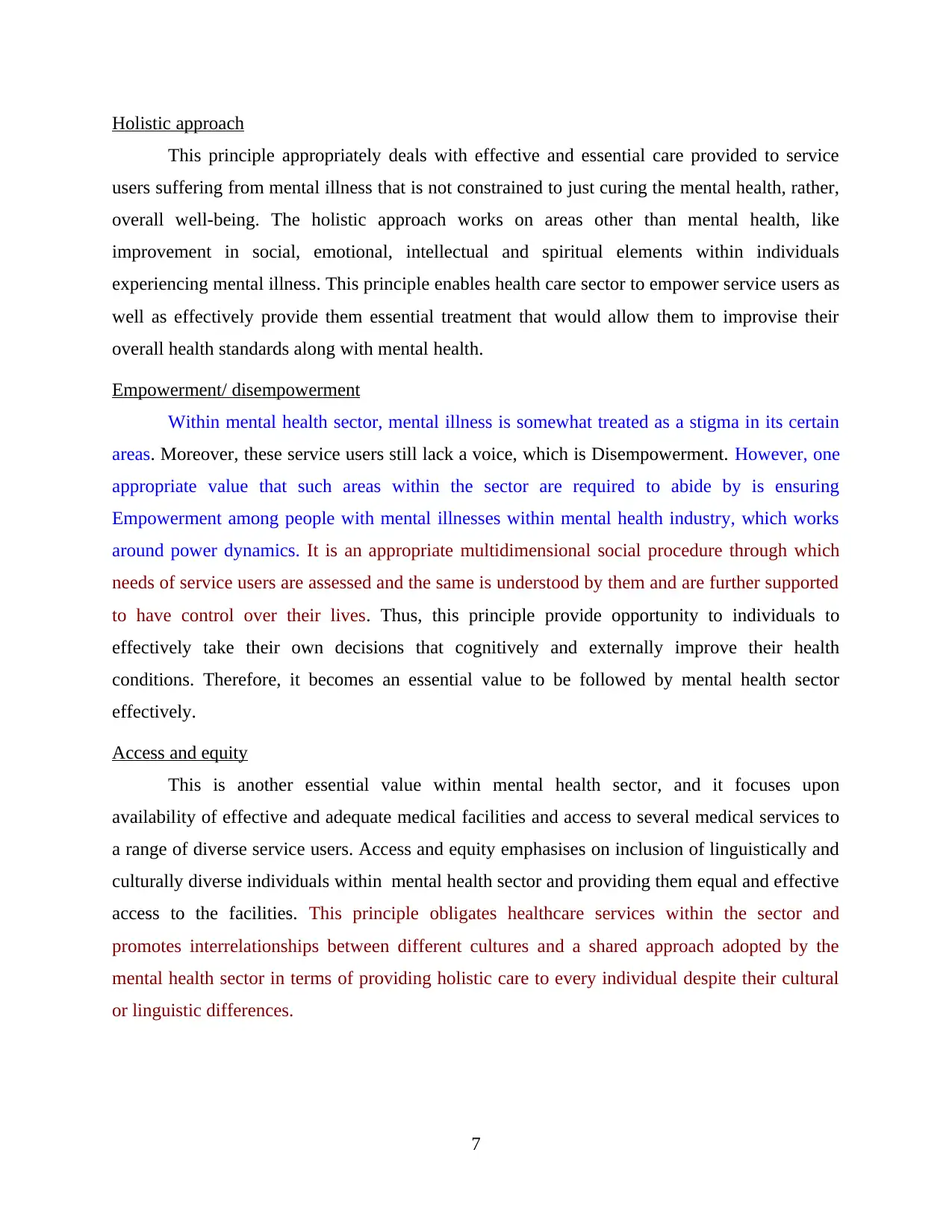
Holistic approach
This principle appropriately deals with effective and essential care provided to service
users suffering from mental illness that is not constrained to just curing the mental health, rather,
overall well-being. The holistic approach works on areas other than mental health, like
improvement in social, emotional, intellectual and spiritual elements within individuals
experiencing mental illness. This principle enables health care sector to empower service users as
well as effectively provide them essential treatment that would allow them to improvise their
overall health standards along with mental health.
Empowerment/ disempowerment
Within mental health sector, mental illness is somewhat treated as a stigma in its certain
areas. Moreover, these service users still lack a voice, which is Disempowerment. However, one
appropriate value that such areas within the sector are required to abide by is ensuring
Empowerment among people with mental illnesses within mental health industry, which works
around power dynamics. It is an appropriate multidimensional social procedure through which
needs of service users are assessed and the same is understood by them and are further supported
to have control over their lives. Thus, this principle provide opportunity to individuals to
effectively take their own decisions that cognitively and externally improve their health
conditions. Therefore, it becomes an essential value to be followed by mental health sector
effectively.
Access and equity
This is another essential value within mental health sector, and it focuses upon
availability of effective and adequate medical facilities and access to several medical services to
a range of diverse service users. Access and equity emphasises on inclusion of linguistically and
culturally diverse individuals within mental health sector and providing them equal and effective
access to the facilities. This principle obligates healthcare services within the sector and
promotes interrelationships between different cultures and a shared approach adopted by the
mental health sector in terms of providing holistic care to every individual despite their cultural
or linguistic differences.
7
This principle appropriately deals with effective and essential care provided to service
users suffering from mental illness that is not constrained to just curing the mental health, rather,
overall well-being. The holistic approach works on areas other than mental health, like
improvement in social, emotional, intellectual and spiritual elements within individuals
experiencing mental illness. This principle enables health care sector to empower service users as
well as effectively provide them essential treatment that would allow them to improvise their
overall health standards along with mental health.
Empowerment/ disempowerment
Within mental health sector, mental illness is somewhat treated as a stigma in its certain
areas. Moreover, these service users still lack a voice, which is Disempowerment. However, one
appropriate value that such areas within the sector are required to abide by is ensuring
Empowerment among people with mental illnesses within mental health industry, which works
around power dynamics. It is an appropriate multidimensional social procedure through which
needs of service users are assessed and the same is understood by them and are further supported
to have control over their lives. Thus, this principle provide opportunity to individuals to
effectively take their own decisions that cognitively and externally improve their health
conditions. Therefore, it becomes an essential value to be followed by mental health sector
effectively.
Access and equity
This is another essential value within mental health sector, and it focuses upon
availability of effective and adequate medical facilities and access to several medical services to
a range of diverse service users. Access and equity emphasises on inclusion of linguistically and
culturally diverse individuals within mental health sector and providing them equal and effective
access to the facilities. This principle obligates healthcare services within the sector and
promotes interrelationships between different cultures and a shared approach adopted by the
mental health sector in terms of providing holistic care to every individual despite their cultural
or linguistic differences.
7
Secure Best Marks with AI Grader
Need help grading? Try our AI Grader for instant feedback on your assignments.
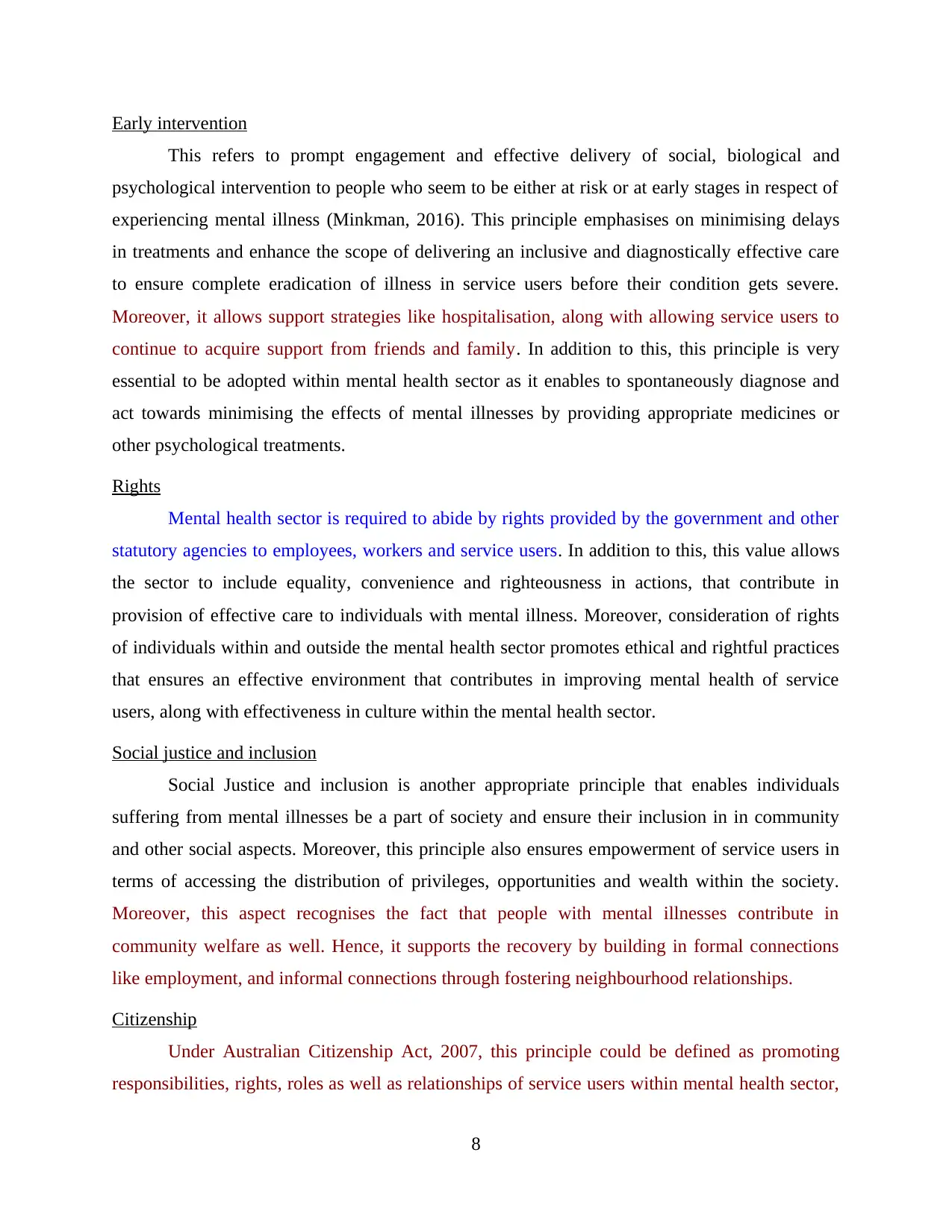
Early intervention
This refers to prompt engagement and effective delivery of social, biological and
psychological intervention to people who seem to be either at risk or at early stages in respect of
experiencing mental illness (Minkman, 2016). This principle emphasises on minimising delays
in treatments and enhance the scope of delivering an inclusive and diagnostically effective care
to ensure complete eradication of illness in service users before their condition gets severe.
Moreover, it allows support strategies like hospitalisation, along with allowing service users to
continue to acquire support from friends and family. In addition to this, this principle is very
essential to be adopted within mental health sector as it enables to spontaneously diagnose and
act towards minimising the effects of mental illnesses by providing appropriate medicines or
other psychological treatments.
Rights
Mental health sector is required to abide by rights provided by the government and other
statutory agencies to employees, workers and service users. In addition to this, this value allows
the sector to include equality, convenience and righteousness in actions, that contribute in
provision of effective care to individuals with mental illness. Moreover, consideration of rights
of individuals within and outside the mental health sector promotes ethical and rightful practices
that ensures an effective environment that contributes in improving mental health of service
users, along with effectiveness in culture within the mental health sector.
Social justice and inclusion
Social Justice and inclusion is another appropriate principle that enables individuals
suffering from mental illnesses be a part of society and ensure their inclusion in in community
and other social aspects. Moreover, this principle also ensures empowerment of service users in
terms of accessing the distribution of privileges, opportunities and wealth within the society.
Moreover, this aspect recognises the fact that people with mental illnesses contribute in
community welfare as well. Hence, it supports the recovery by building in formal connections
like employment, and informal connections through fostering neighbourhood relationships.
Citizenship
Under Australian Citizenship Act, 2007, this principle could be defined as promoting
responsibilities, rights, roles as well as relationships of service users within mental health sector,
8
This refers to prompt engagement and effective delivery of social, biological and
psychological intervention to people who seem to be either at risk or at early stages in respect of
experiencing mental illness (Minkman, 2016). This principle emphasises on minimising delays
in treatments and enhance the scope of delivering an inclusive and diagnostically effective care
to ensure complete eradication of illness in service users before their condition gets severe.
Moreover, it allows support strategies like hospitalisation, along with allowing service users to
continue to acquire support from friends and family. In addition to this, this principle is very
essential to be adopted within mental health sector as it enables to spontaneously diagnose and
act towards minimising the effects of mental illnesses by providing appropriate medicines or
other psychological treatments.
Rights
Mental health sector is required to abide by rights provided by the government and other
statutory agencies to employees, workers and service users. In addition to this, this value allows
the sector to include equality, convenience and righteousness in actions, that contribute in
provision of effective care to individuals with mental illness. Moreover, consideration of rights
of individuals within and outside the mental health sector promotes ethical and rightful practices
that ensures an effective environment that contributes in improving mental health of service
users, along with effectiveness in culture within the mental health sector.
Social justice and inclusion
Social Justice and inclusion is another appropriate principle that enables individuals
suffering from mental illnesses be a part of society and ensure their inclusion in in community
and other social aspects. Moreover, this principle also ensures empowerment of service users in
terms of accessing the distribution of privileges, opportunities and wealth within the society.
Moreover, this aspect recognises the fact that people with mental illnesses contribute in
community welfare as well. Hence, it supports the recovery by building in formal connections
like employment, and informal connections through fostering neighbourhood relationships.
Citizenship
Under Australian Citizenship Act, 2007, this principle could be defined as promoting
responsibilities, rights, roles as well as relationships of service users within mental health sector,
8
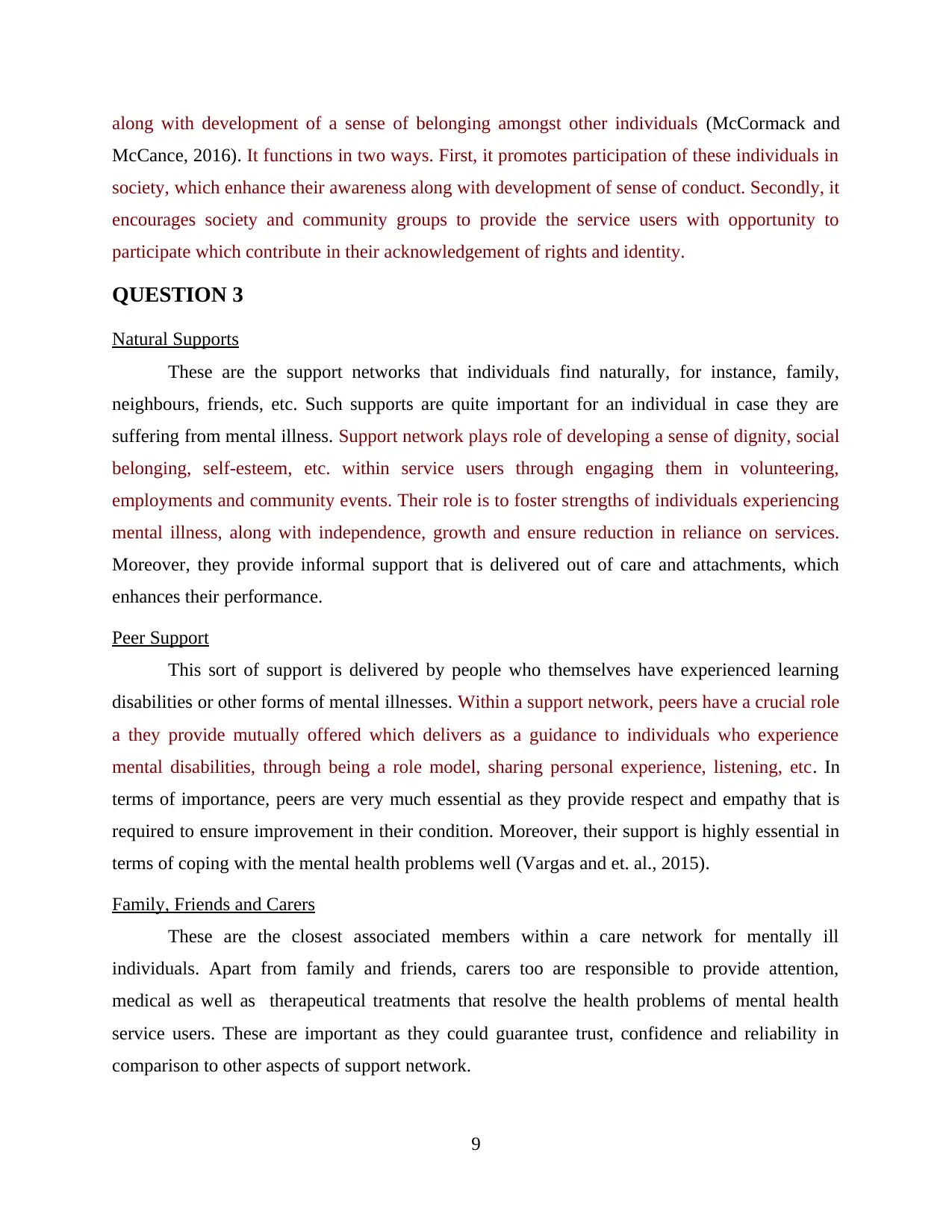
along with development of a sense of belonging amongst other individuals (McCormack and
McCance, 2016). It functions in two ways. First, it promotes participation of these individuals in
society, which enhance their awareness along with development of sense of conduct. Secondly, it
encourages society and community groups to provide the service users with opportunity to
participate which contribute in their acknowledgement of rights and identity.
QUESTION 3
Natural Supports
These are the support networks that individuals find naturally, for instance, family,
neighbours, friends, etc. Such supports are quite important for an individual in case they are
suffering from mental illness. Support network plays role of developing a sense of dignity, social
belonging, self-esteem, etc. within service users through engaging them in volunteering,
employments and community events. Their role is to foster strengths of individuals experiencing
mental illness, along with independence, growth and ensure reduction in reliance on services.
Moreover, they provide informal support that is delivered out of care and attachments, which
enhances their performance.
Peer Support
This sort of support is delivered by people who themselves have experienced learning
disabilities or other forms of mental illnesses. Within a support network, peers have a crucial role
a they provide mutually offered which delivers as a guidance to individuals who experience
mental disabilities, through being a role model, sharing personal experience, listening, etc. In
terms of importance, peers are very much essential as they provide respect and empathy that is
required to ensure improvement in their condition. Moreover, their support is highly essential in
terms of coping with the mental health problems well (Vargas and et. al., 2015).
Family, Friends and Carers
These are the closest associated members within a care network for mentally ill
individuals. Apart from family and friends, carers too are responsible to provide attention,
medical as well as therapeutical treatments that resolve the health problems of mental health
service users. These are important as they could guarantee trust, confidence and reliability in
comparison to other aspects of support network.
9
McCance, 2016). It functions in two ways. First, it promotes participation of these individuals in
society, which enhance their awareness along with development of sense of conduct. Secondly, it
encourages society and community groups to provide the service users with opportunity to
participate which contribute in their acknowledgement of rights and identity.
QUESTION 3
Natural Supports
These are the support networks that individuals find naturally, for instance, family,
neighbours, friends, etc. Such supports are quite important for an individual in case they are
suffering from mental illness. Support network plays role of developing a sense of dignity, social
belonging, self-esteem, etc. within service users through engaging them in volunteering,
employments and community events. Their role is to foster strengths of individuals experiencing
mental illness, along with independence, growth and ensure reduction in reliance on services.
Moreover, they provide informal support that is delivered out of care and attachments, which
enhances their performance.
Peer Support
This sort of support is delivered by people who themselves have experienced learning
disabilities or other forms of mental illnesses. Within a support network, peers have a crucial role
a they provide mutually offered which delivers as a guidance to individuals who experience
mental disabilities, through being a role model, sharing personal experience, listening, etc. In
terms of importance, peers are very much essential as they provide respect and empathy that is
required to ensure improvement in their condition. Moreover, their support is highly essential in
terms of coping with the mental health problems well (Vargas and et. al., 2015).
Family, Friends and Carers
These are the closest associated members within a care network for mentally ill
individuals. Apart from family and friends, carers too are responsible to provide attention,
medical as well as therapeutical treatments that resolve the health problems of mental health
service users. These are important as they could guarantee trust, confidence and reliability in
comparison to other aspects of support network.
9
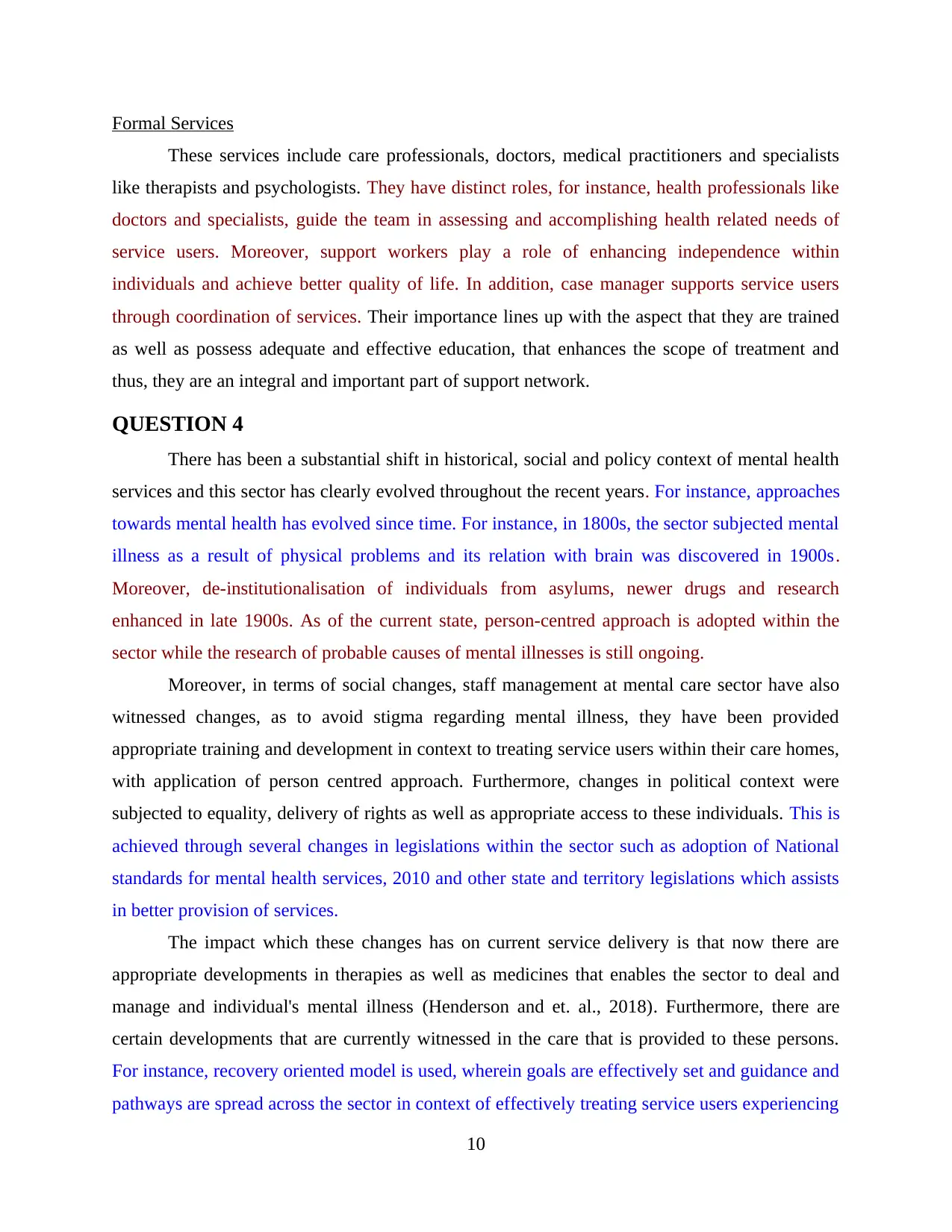
Formal Services
These services include care professionals, doctors, medical practitioners and specialists
like therapists and psychologists. They have distinct roles, for instance, health professionals like
doctors and specialists, guide the team in assessing and accomplishing health related needs of
service users. Moreover, support workers play a role of enhancing independence within
individuals and achieve better quality of life. In addition, case manager supports service users
through coordination of services. Their importance lines up with the aspect that they are trained
as well as possess adequate and effective education, that enhances the scope of treatment and
thus, they are an integral and important part of support network.
QUESTION 4
There has been a substantial shift in historical, social and policy context of mental health
services and this sector has clearly evolved throughout the recent years. For instance, approaches
towards mental health has evolved since time. For instance, in 1800s, the sector subjected mental
illness as a result of physical problems and its relation with brain was discovered in 1900s.
Moreover, de-institutionalisation of individuals from asylums, newer drugs and research
enhanced in late 1900s. As of the current state, person-centred approach is adopted within the
sector while the research of probable causes of mental illnesses is still ongoing.
Moreover, in terms of social changes, staff management at mental care sector have also
witnessed changes, as to avoid stigma regarding mental illness, they have been provided
appropriate training and development in context to treating service users within their care homes,
with application of person centred approach. Furthermore, changes in political context were
subjected to equality, delivery of rights as well as appropriate access to these individuals. This is
achieved through several changes in legislations within the sector such as adoption of National
standards for mental health services, 2010 and other state and territory legislations which assists
in better provision of services.
The impact which these changes has on current service delivery is that now there are
appropriate developments in therapies as well as medicines that enables the sector to deal and
manage and individual's mental illness (Henderson and et. al., 2018). Furthermore, there are
certain developments that are currently witnessed in the care that is provided to these persons.
For instance, recovery oriented model is used, wherein goals are effectively set and guidance and
pathways are spread across the sector in context of effectively treating service users experiencing
10
These services include care professionals, doctors, medical practitioners and specialists
like therapists and psychologists. They have distinct roles, for instance, health professionals like
doctors and specialists, guide the team in assessing and accomplishing health related needs of
service users. Moreover, support workers play a role of enhancing independence within
individuals and achieve better quality of life. In addition, case manager supports service users
through coordination of services. Their importance lines up with the aspect that they are trained
as well as possess adequate and effective education, that enhances the scope of treatment and
thus, they are an integral and important part of support network.
QUESTION 4
There has been a substantial shift in historical, social and policy context of mental health
services and this sector has clearly evolved throughout the recent years. For instance, approaches
towards mental health has evolved since time. For instance, in 1800s, the sector subjected mental
illness as a result of physical problems and its relation with brain was discovered in 1900s.
Moreover, de-institutionalisation of individuals from asylums, newer drugs and research
enhanced in late 1900s. As of the current state, person-centred approach is adopted within the
sector while the research of probable causes of mental illnesses is still ongoing.
Moreover, in terms of social changes, staff management at mental care sector have also
witnessed changes, as to avoid stigma regarding mental illness, they have been provided
appropriate training and development in context to treating service users within their care homes,
with application of person centred approach. Furthermore, changes in political context were
subjected to equality, delivery of rights as well as appropriate access to these individuals. This is
achieved through several changes in legislations within the sector such as adoption of National
standards for mental health services, 2010 and other state and territory legislations which assists
in better provision of services.
The impact which these changes has on current service delivery is that now there are
appropriate developments in therapies as well as medicines that enables the sector to deal and
manage and individual's mental illness (Henderson and et. al., 2018). Furthermore, there are
certain developments that are currently witnessed in the care that is provided to these persons.
For instance, recovery oriented model is used, wherein goals are effectively set and guidance and
pathways are spread across the sector in context of effectively treating service users experiencing
10
Paraphrase This Document
Need a fresh take? Get an instant paraphrase of this document with our AI Paraphraser
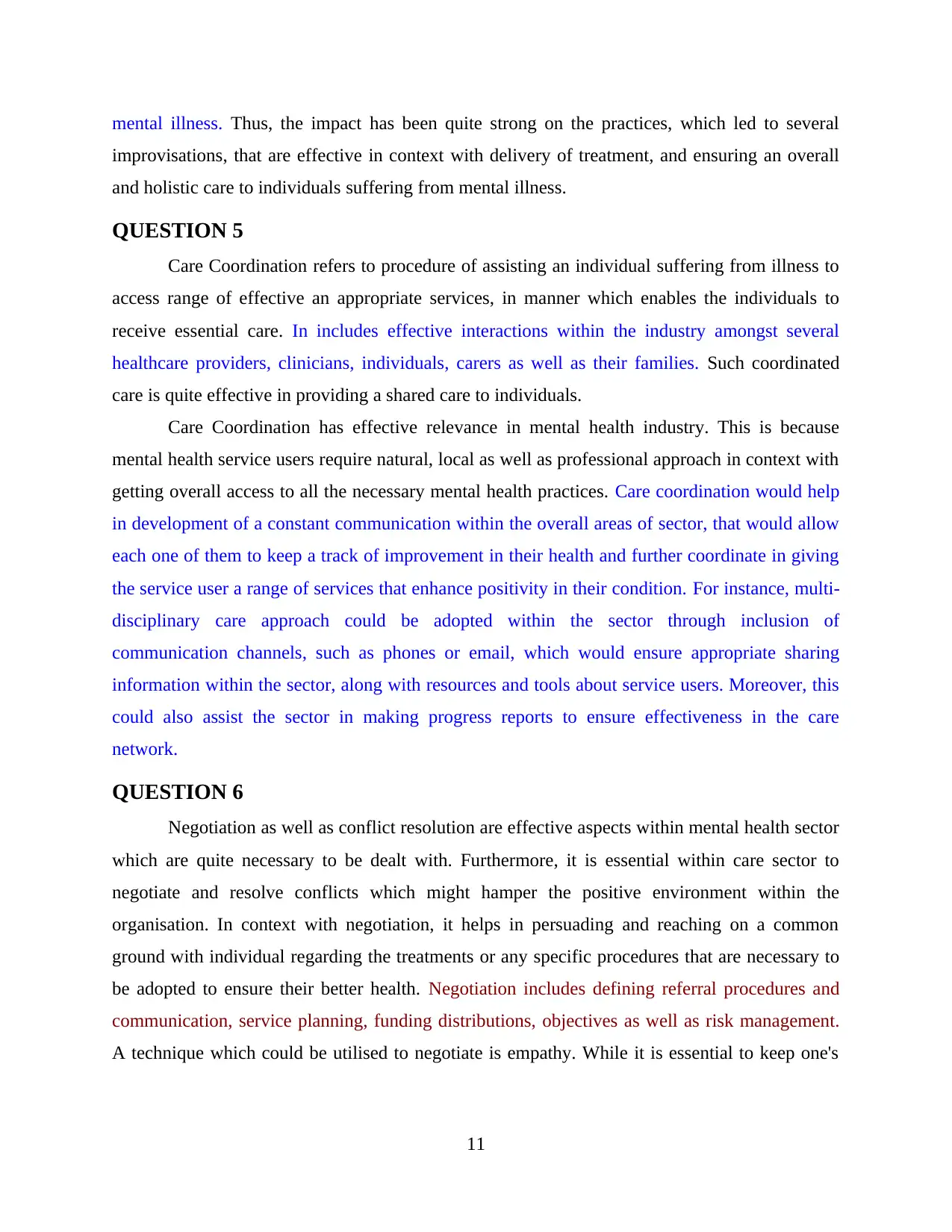
mental illness. Thus, the impact has been quite strong on the practices, which led to several
improvisations, that are effective in context with delivery of treatment, and ensuring an overall
and holistic care to individuals suffering from mental illness.
QUESTION 5
Care Coordination refers to procedure of assisting an individual suffering from illness to
access range of effective an appropriate services, in manner which enables the individuals to
receive essential care. In includes effective interactions within the industry amongst several
healthcare providers, clinicians, individuals, carers as well as their families. Such coordinated
care is quite effective in providing a shared care to individuals.
Care Coordination has effective relevance in mental health industry. This is because
mental health service users require natural, local as well as professional approach in context with
getting overall access to all the necessary mental health practices. Care coordination would help
in development of a constant communication within the overall areas of sector, that would allow
each one of them to keep a track of improvement in their health and further coordinate in giving
the service user a range of services that enhance positivity in their condition. For instance, multi-
disciplinary care approach could be adopted within the sector through inclusion of
communication channels, such as phones or email, which would ensure appropriate sharing
information within the sector, along with resources and tools about service users. Moreover, this
could also assist the sector in making progress reports to ensure effectiveness in the care
network.
QUESTION 6
Negotiation as well as conflict resolution are effective aspects within mental health sector
which are quite necessary to be dealt with. Furthermore, it is essential within care sector to
negotiate and resolve conflicts which might hamper the positive environment within the
organisation. In context with negotiation, it helps in persuading and reaching on a common
ground with individual regarding the treatments or any specific procedures that are necessary to
be adopted to ensure their better health. Negotiation includes defining referral procedures and
communication, service planning, funding distributions, objectives as well as risk management.
A technique which could be utilised to negotiate is empathy. While it is essential to keep one's
11
improvisations, that are effective in context with delivery of treatment, and ensuring an overall
and holistic care to individuals suffering from mental illness.
QUESTION 5
Care Coordination refers to procedure of assisting an individual suffering from illness to
access range of effective an appropriate services, in manner which enables the individuals to
receive essential care. In includes effective interactions within the industry amongst several
healthcare providers, clinicians, individuals, carers as well as their families. Such coordinated
care is quite effective in providing a shared care to individuals.
Care Coordination has effective relevance in mental health industry. This is because
mental health service users require natural, local as well as professional approach in context with
getting overall access to all the necessary mental health practices. Care coordination would help
in development of a constant communication within the overall areas of sector, that would allow
each one of them to keep a track of improvement in their health and further coordinate in giving
the service user a range of services that enhance positivity in their condition. For instance, multi-
disciplinary care approach could be adopted within the sector through inclusion of
communication channels, such as phones or email, which would ensure appropriate sharing
information within the sector, along with resources and tools about service users. Moreover, this
could also assist the sector in making progress reports to ensure effectiveness in the care
network.
QUESTION 6
Negotiation as well as conflict resolution are effective aspects within mental health sector
which are quite necessary to be dealt with. Furthermore, it is essential within care sector to
negotiate and resolve conflicts which might hamper the positive environment within the
organisation. In context with negotiation, it helps in persuading and reaching on a common
ground with individual regarding the treatments or any specific procedures that are necessary to
be adopted to ensure their better health. Negotiation includes defining referral procedures and
communication, service planning, funding distributions, objectives as well as risk management.
A technique which could be utilised to negotiate is empathy. While it is essential to keep one's
11
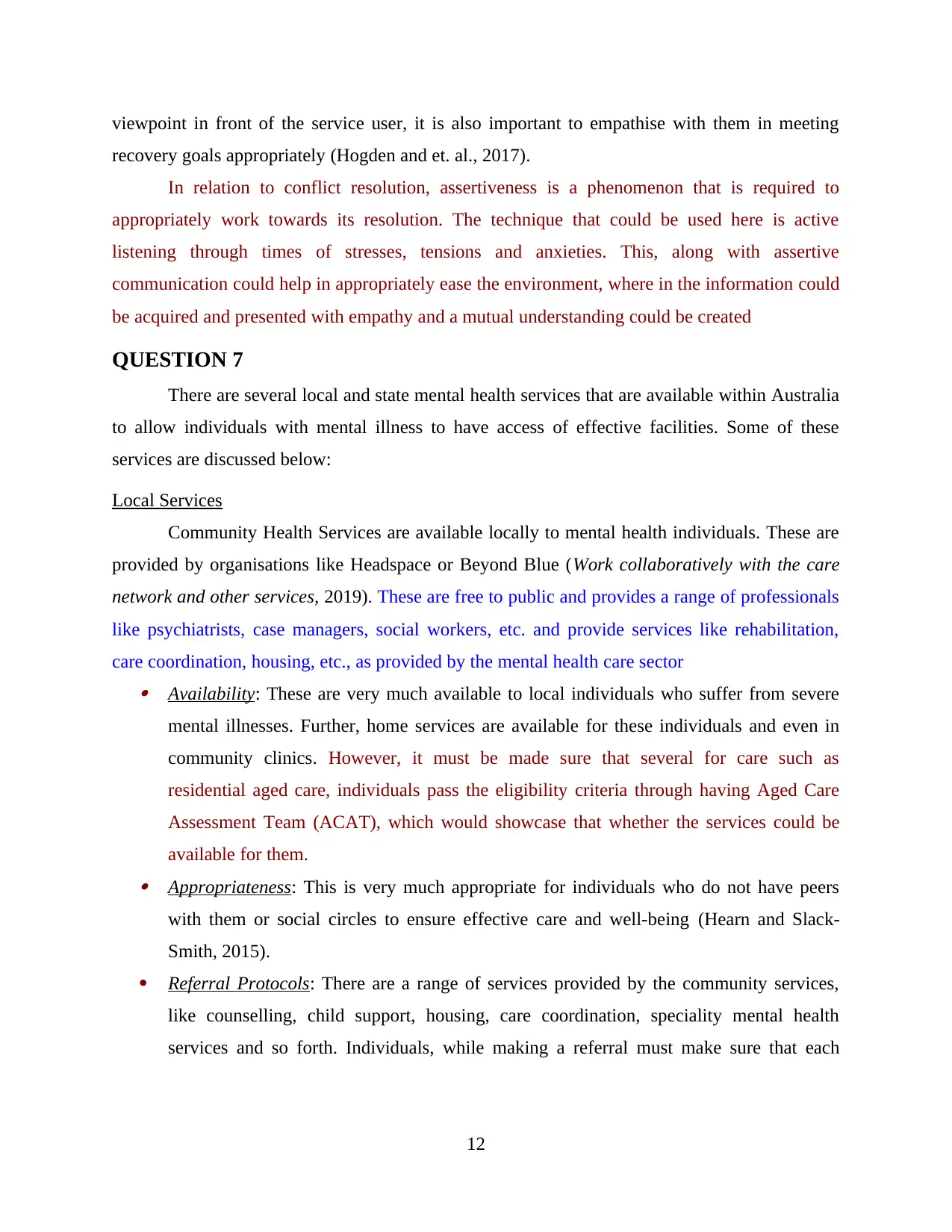
viewpoint in front of the service user, it is also important to empathise with them in meeting
recovery goals appropriately (Hogden and et. al., 2017).
In relation to conflict resolution, assertiveness is a phenomenon that is required to
appropriately work towards its resolution. The technique that could be used here is active
listening through times of stresses, tensions and anxieties. This, along with assertive
communication could help in appropriately ease the environment, where in the information could
be acquired and presented with empathy and a mutual understanding could be created
QUESTION 7
There are several local and state mental health services that are available within Australia
to allow individuals with mental illness to have access of effective facilities. Some of these
services are discussed below:
Local Services
Community Health Services are available locally to mental health individuals. These are
provided by organisations like Headspace or Beyond Blue (Work collaboratively with the care
network and other services, 2019). These are free to public and provides a range of professionals
like psychiatrists, case managers, social workers, etc. and provide services like rehabilitation,
care coordination, housing, etc., as provided by the mental health care sector Availability: These are very much available to local individuals who suffer from severe
mental illnesses. Further, home services are available for these individuals and even in
community clinics. However, it must be made sure that several for care such as
residential aged care, individuals pass the eligibility criteria through having Aged Care
Assessment Team (ACAT), which would showcase that whether the services could be
available for them. Appropriateness: This is very much appropriate for individuals who do not have peers
with them or social circles to ensure effective care and well-being (Hearn and Slack-
Smith, 2015).
Referral Protocols: There are a range of services provided by the community services,
like counselling, child support, housing, care coordination, speciality mental health
services and so forth. Individuals, while making a referral must make sure that each
12
recovery goals appropriately (Hogden and et. al., 2017).
In relation to conflict resolution, assertiveness is a phenomenon that is required to
appropriately work towards its resolution. The technique that could be used here is active
listening through times of stresses, tensions and anxieties. This, along with assertive
communication could help in appropriately ease the environment, where in the information could
be acquired and presented with empathy and a mutual understanding could be created
QUESTION 7
There are several local and state mental health services that are available within Australia
to allow individuals with mental illness to have access of effective facilities. Some of these
services are discussed below:
Local Services
Community Health Services are available locally to mental health individuals. These are
provided by organisations like Headspace or Beyond Blue (Work collaboratively with the care
network and other services, 2019). These are free to public and provides a range of professionals
like psychiatrists, case managers, social workers, etc. and provide services like rehabilitation,
care coordination, housing, etc., as provided by the mental health care sector Availability: These are very much available to local individuals who suffer from severe
mental illnesses. Further, home services are available for these individuals and even in
community clinics. However, it must be made sure that several for care such as
residential aged care, individuals pass the eligibility criteria through having Aged Care
Assessment Team (ACAT), which would showcase that whether the services could be
available for them. Appropriateness: This is very much appropriate for individuals who do not have peers
with them or social circles to ensure effective care and well-being (Hearn and Slack-
Smith, 2015).
Referral Protocols: There are a range of services provided by the community services,
like counselling, child support, housing, care coordination, speciality mental health
services and so forth. Individuals, while making a referral must make sure that each
12
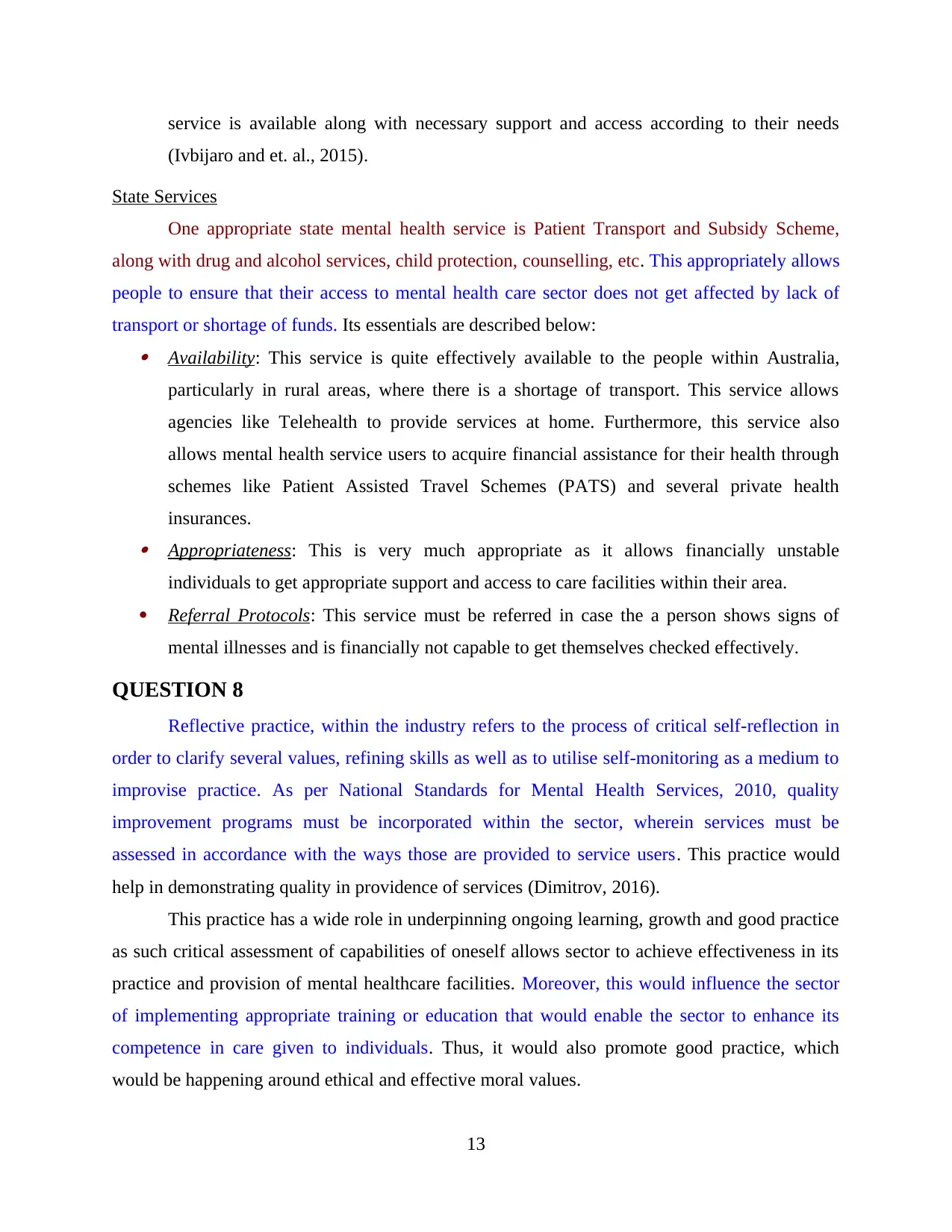
service is available along with necessary support and access according to their needs
(Ivbijaro and et. al., 2015).
State Services
One appropriate state mental health service is Patient Transport and Subsidy Scheme,
along with drug and alcohol services, child protection, counselling, etc. This appropriately allows
people to ensure that their access to mental health care sector does not get affected by lack of
transport or shortage of funds. Its essentials are described below: Availability: This service is quite effectively available to the people within Australia,
particularly in rural areas, where there is a shortage of transport. This service allows
agencies like Telehealth to provide services at home. Furthermore, this service also
allows mental health service users to acquire financial assistance for their health through
schemes like Patient Assisted Travel Schemes (PATS) and several private health
insurances. Appropriateness: This is very much appropriate as it allows financially unstable
individuals to get appropriate support and access to care facilities within their area.
Referral Protocols: This service must be referred in case the a person shows signs of
mental illnesses and is financially not capable to get themselves checked effectively.
QUESTION 8
Reflective practice, within the industry refers to the process of critical self-reflection in
order to clarify several values, refining skills as well as to utilise self-monitoring as a medium to
improvise practice. As per National Standards for Mental Health Services, 2010, quality
improvement programs must be incorporated within the sector, wherein services must be
assessed in accordance with the ways those are provided to service users. This practice would
help in demonstrating quality in providence of services (Dimitrov, 2016).
This practice has a wide role in underpinning ongoing learning, growth and good practice
as such critical assessment of capabilities of oneself allows sector to achieve effectiveness in its
practice and provision of mental healthcare facilities. Moreover, this would influence the sector
of implementing appropriate training or education that would enable the sector to enhance its
competence in care given to individuals. Thus, it would also promote good practice, which
would be happening around ethical and effective moral values.
13
(Ivbijaro and et. al., 2015).
State Services
One appropriate state mental health service is Patient Transport and Subsidy Scheme,
along with drug and alcohol services, child protection, counselling, etc. This appropriately allows
people to ensure that their access to mental health care sector does not get affected by lack of
transport or shortage of funds. Its essentials are described below: Availability: This service is quite effectively available to the people within Australia,
particularly in rural areas, where there is a shortage of transport. This service allows
agencies like Telehealth to provide services at home. Furthermore, this service also
allows mental health service users to acquire financial assistance for their health through
schemes like Patient Assisted Travel Schemes (PATS) and several private health
insurances. Appropriateness: This is very much appropriate as it allows financially unstable
individuals to get appropriate support and access to care facilities within their area.
Referral Protocols: This service must be referred in case the a person shows signs of
mental illnesses and is financially not capable to get themselves checked effectively.
QUESTION 8
Reflective practice, within the industry refers to the process of critical self-reflection in
order to clarify several values, refining skills as well as to utilise self-monitoring as a medium to
improvise practice. As per National Standards for Mental Health Services, 2010, quality
improvement programs must be incorporated within the sector, wherein services must be
assessed in accordance with the ways those are provided to service users. This practice would
help in demonstrating quality in providence of services (Dimitrov, 2016).
This practice has a wide role in underpinning ongoing learning, growth and good practice
as such critical assessment of capabilities of oneself allows sector to achieve effectiveness in its
practice and provision of mental healthcare facilities. Moreover, this would influence the sector
of implementing appropriate training or education that would enable the sector to enhance its
competence in care given to individuals. Thus, it would also promote good practice, which
would be happening around ethical and effective moral values.
13
Secure Best Marks with AI Grader
Need help grading? Try our AI Grader for instant feedback on your assignments.
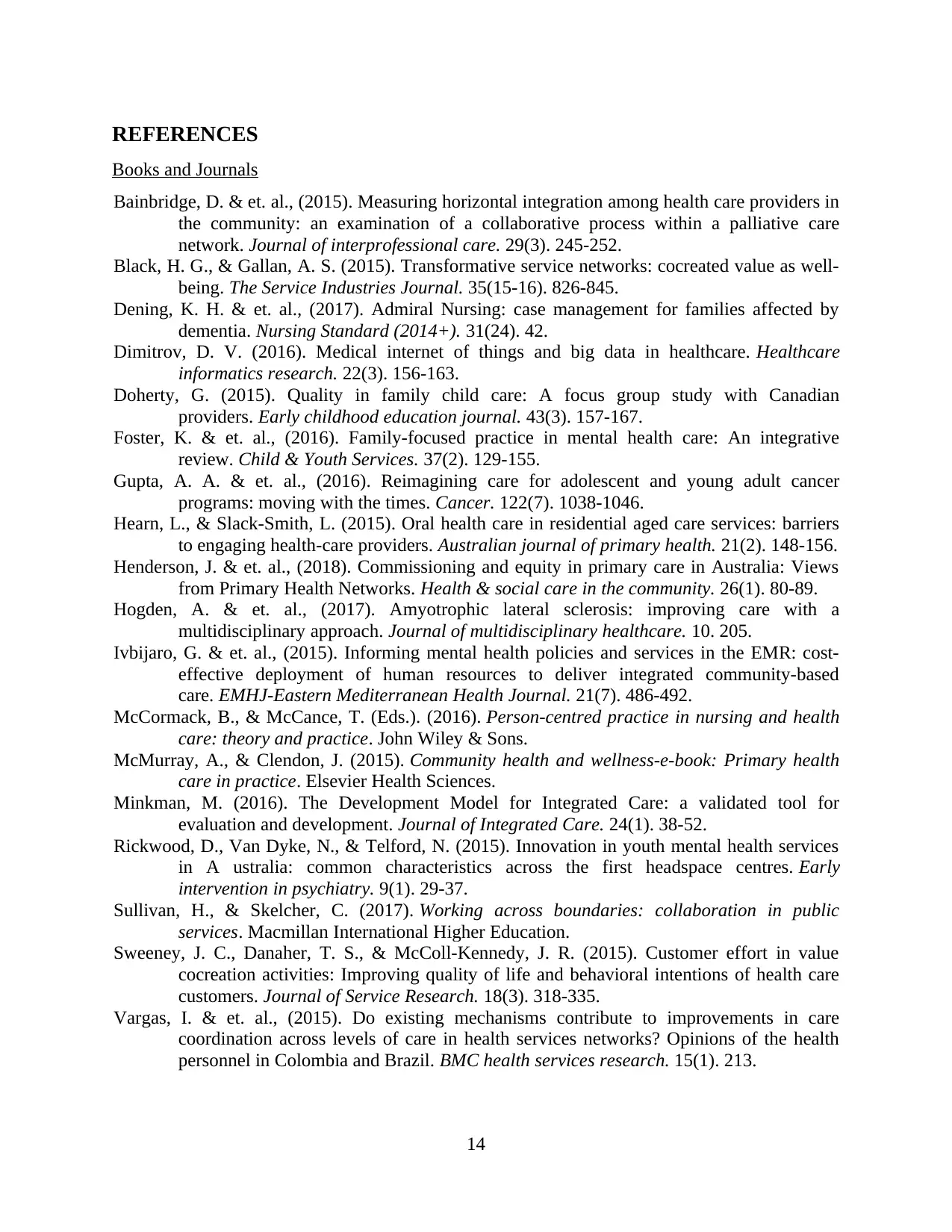
REFERENCES
Books and Journals
Bainbridge, D. & et. al., (2015). Measuring horizontal integration among health care providers in
the community: an examination of a collaborative process within a palliative care
network. Journal of interprofessional care. 29(3). 245-252.
Black, H. G., & Gallan, A. S. (2015). Transformative service networks: cocreated value as well-
being. The Service Industries Journal. 35(15-16). 826-845.
Dening, K. H. & et. al., (2017). Admiral Nursing: case management for families affected by
dementia. Nursing Standard (2014+). 31(24). 42.
Dimitrov, D. V. (2016). Medical internet of things and big data in healthcare. Healthcare
informatics research. 22(3). 156-163.
Doherty, G. (2015). Quality in family child care: A focus group study with Canadian
providers. Early childhood education journal. 43(3). 157-167.
Foster, K. & et. al., (2016). Family-focused practice in mental health care: An integrative
review. Child & Youth Services. 37(2). 129-155.
Gupta, A. A. & et. al., (2016). Reimagining care for adolescent and young adult cancer
programs: moving with the times. Cancer. 122(7). 1038-1046.
Hearn, L., & Slack-Smith, L. (2015). Oral health care in residential aged care services: barriers
to engaging health-care providers. Australian journal of primary health. 21(2). 148-156.
Henderson, J. & et. al., (2018). Commissioning and equity in primary care in Australia: Views
from Primary Health Networks. Health & social care in the community. 26(1). 80-89.
Hogden, A. & et. al., (2017). Amyotrophic lateral sclerosis: improving care with a
multidisciplinary approach. Journal of multidisciplinary healthcare. 10. 205.
Ivbijaro, G. & et. al., (2015). Informing mental health policies and services in the EMR: cost-
effective deployment of human resources to deliver integrated community-based
care. EMHJ-Eastern Mediterranean Health Journal. 21(7). 486-492.
McCormack, B., & McCance, T. (Eds.). (2016). Person-centred practice in nursing and health
care: theory and practice. John Wiley & Sons.
McMurray, A., & Clendon, J. (2015). Community health and wellness-e-book: Primary health
care in practice. Elsevier Health Sciences.
Minkman, M. (2016). The Development Model for Integrated Care: a validated tool for
evaluation and development. Journal of Integrated Care. 24(1). 38-52.
Rickwood, D., Van Dyke, N., & Telford, N. (2015). Innovation in youth mental health services
in A ustralia: common characteristics across the first headspace centres. Early
intervention in psychiatry. 9(1). 29-37.
Sullivan, H., & Skelcher, C. (2017). Working across boundaries: collaboration in public
services. Macmillan International Higher Education.
Sweeney, J. C., Danaher, T. S., & McColl-Kennedy, J. R. (2015). Customer effort in value
cocreation activities: Improving quality of life and behavioral intentions of health care
customers. Journal of Service Research. 18(3). 318-335.
Vargas, I. & et. al., (2015). Do existing mechanisms contribute to improvements in care
coordination across levels of care in health services networks? Opinions of the health
personnel in Colombia and Brazil. BMC health services research. 15(1). 213.
14
Books and Journals
Bainbridge, D. & et. al., (2015). Measuring horizontal integration among health care providers in
the community: an examination of a collaborative process within a palliative care
network. Journal of interprofessional care. 29(3). 245-252.
Black, H. G., & Gallan, A. S. (2015). Transformative service networks: cocreated value as well-
being. The Service Industries Journal. 35(15-16). 826-845.
Dening, K. H. & et. al., (2017). Admiral Nursing: case management for families affected by
dementia. Nursing Standard (2014+). 31(24). 42.
Dimitrov, D. V. (2016). Medical internet of things and big data in healthcare. Healthcare
informatics research. 22(3). 156-163.
Doherty, G. (2015). Quality in family child care: A focus group study with Canadian
providers. Early childhood education journal. 43(3). 157-167.
Foster, K. & et. al., (2016). Family-focused practice in mental health care: An integrative
review. Child & Youth Services. 37(2). 129-155.
Gupta, A. A. & et. al., (2016). Reimagining care for adolescent and young adult cancer
programs: moving with the times. Cancer. 122(7). 1038-1046.
Hearn, L., & Slack-Smith, L. (2015). Oral health care in residential aged care services: barriers
to engaging health-care providers. Australian journal of primary health. 21(2). 148-156.
Henderson, J. & et. al., (2018). Commissioning and equity in primary care in Australia: Views
from Primary Health Networks. Health & social care in the community. 26(1). 80-89.
Hogden, A. & et. al., (2017). Amyotrophic lateral sclerosis: improving care with a
multidisciplinary approach. Journal of multidisciplinary healthcare. 10. 205.
Ivbijaro, G. & et. al., (2015). Informing mental health policies and services in the EMR: cost-
effective deployment of human resources to deliver integrated community-based
care. EMHJ-Eastern Mediterranean Health Journal. 21(7). 486-492.
McCormack, B., & McCance, T. (Eds.). (2016). Person-centred practice in nursing and health
care: theory and practice. John Wiley & Sons.
McMurray, A., & Clendon, J. (2015). Community health and wellness-e-book: Primary health
care in practice. Elsevier Health Sciences.
Minkman, M. (2016). The Development Model for Integrated Care: a validated tool for
evaluation and development. Journal of Integrated Care. 24(1). 38-52.
Rickwood, D., Van Dyke, N., & Telford, N. (2015). Innovation in youth mental health services
in A ustralia: common characteristics across the first headspace centres. Early
intervention in psychiatry. 9(1). 29-37.
Sullivan, H., & Skelcher, C. (2017). Working across boundaries: collaboration in public
services. Macmillan International Higher Education.
Sweeney, J. C., Danaher, T. S., & McColl-Kennedy, J. R. (2015). Customer effort in value
cocreation activities: Improving quality of life and behavioral intentions of health care
customers. Journal of Service Research. 18(3). 318-335.
Vargas, I. & et. al., (2015). Do existing mechanisms contribute to improvements in care
coordination across levels of care in health services networks? Opinions of the health
personnel in Colombia and Brazil. BMC health services research. 15(1). 213.
14
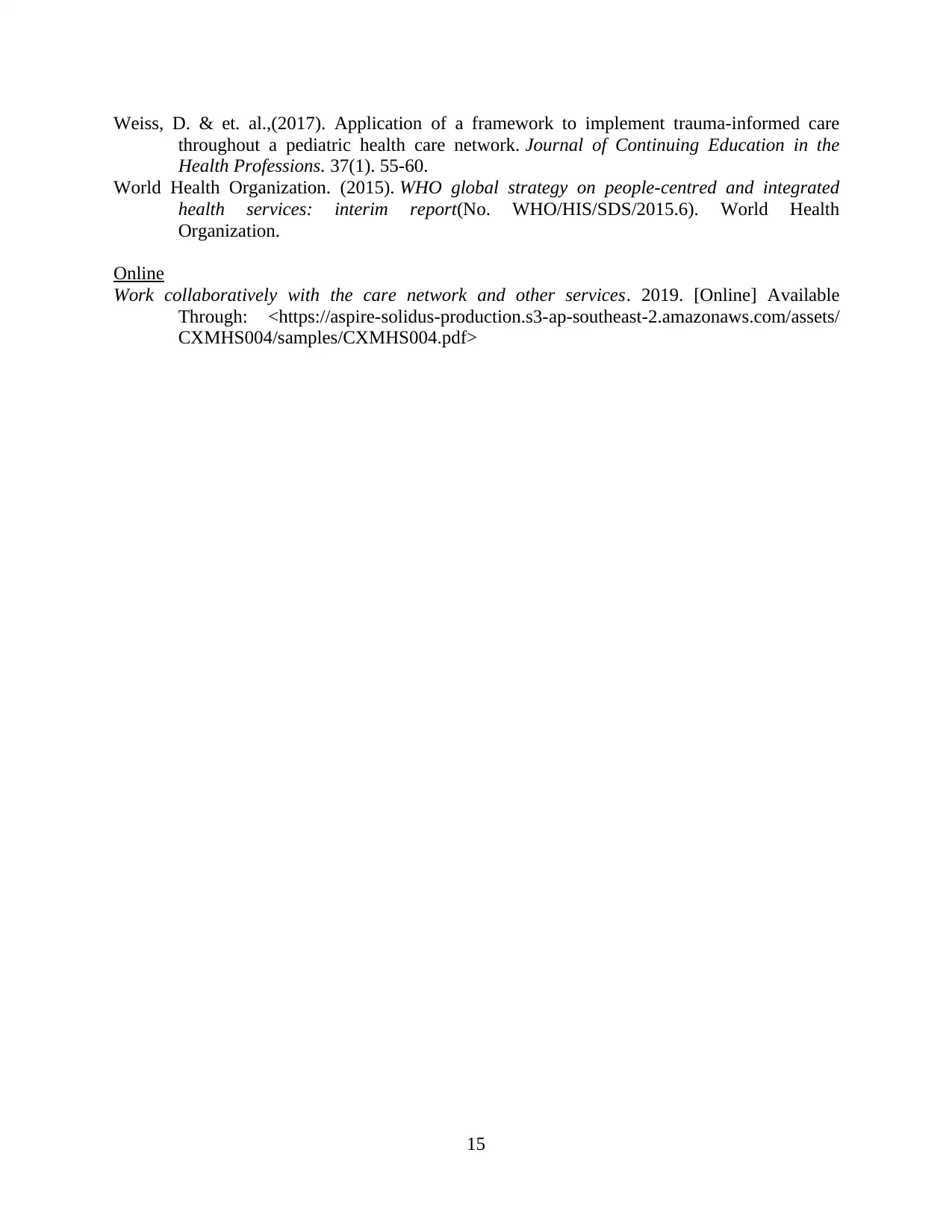
Weiss, D. & et. al.,(2017). Application of a framework to implement trauma-informed care
throughout a pediatric health care network. Journal of Continuing Education in the
Health Professions. 37(1). 55-60.
World Health Organization. (2015). WHO global strategy on people-centred and integrated
health services: interim report(No. WHO/HIS/SDS/2015.6). World Health
Organization.
Online
Work collaboratively with the care network and other services. 2019. [Online] Available
Through: <https://aspire-solidus-production.s3-ap-southeast-2.amazonaws.com/assets/
CXMHS004/samples/CXMHS004.pdf>
15
throughout a pediatric health care network. Journal of Continuing Education in the
Health Professions. 37(1). 55-60.
World Health Organization. (2015). WHO global strategy on people-centred and integrated
health services: interim report(No. WHO/HIS/SDS/2015.6). World Health
Organization.
Online
Work collaboratively with the care network and other services. 2019. [Online] Available
Through: <https://aspire-solidus-production.s3-ap-southeast-2.amazonaws.com/assets/
CXMHS004/samples/CXMHS004.pdf>
15
1 out of 18
Related Documents
Your All-in-One AI-Powered Toolkit for Academic Success.
+13062052269
info@desklib.com
Available 24*7 on WhatsApp / Email
![[object Object]](/_next/static/media/star-bottom.7253800d.svg)
Unlock your academic potential
© 2024 | Zucol Services PVT LTD | All rights reserved.





